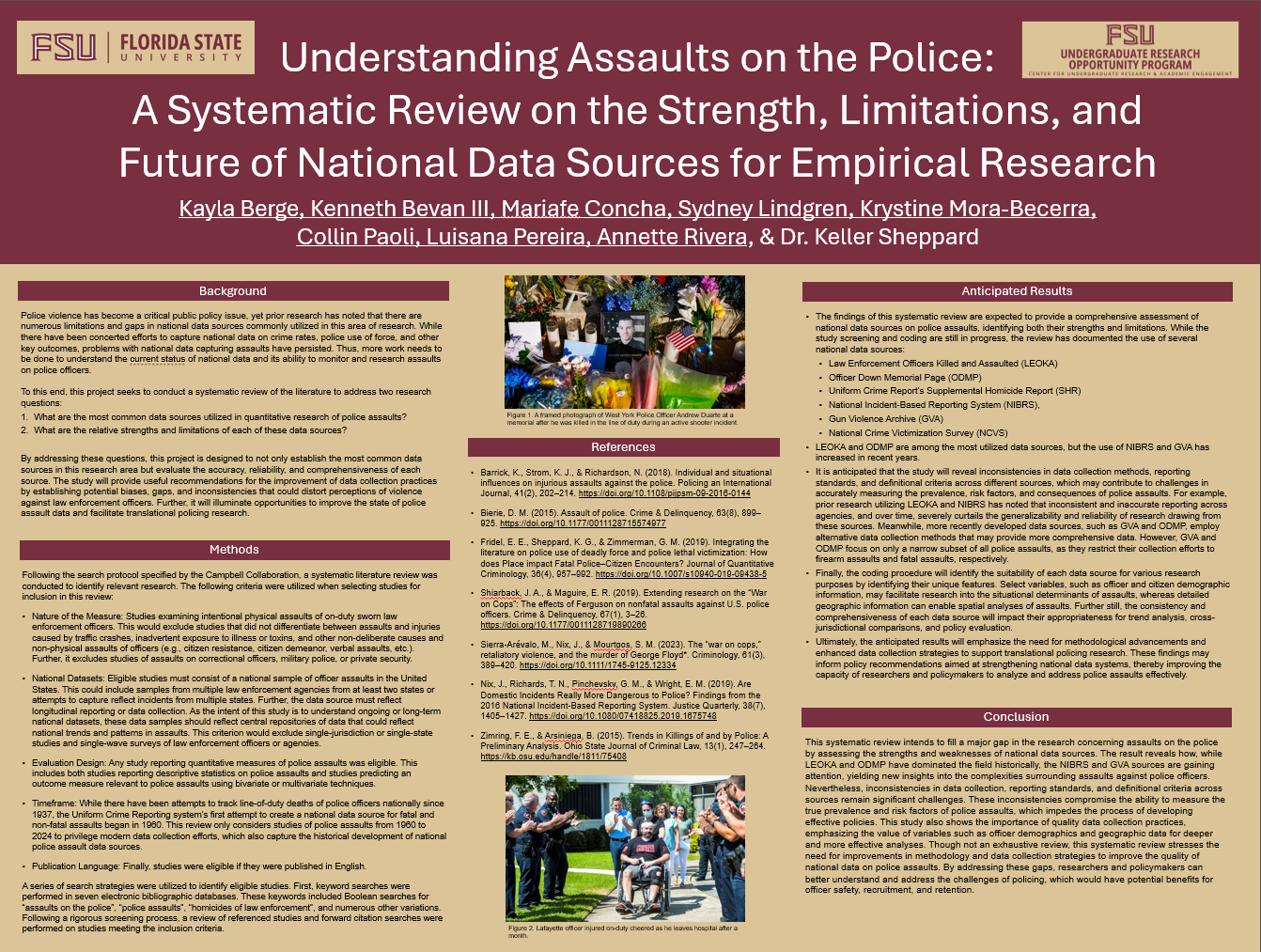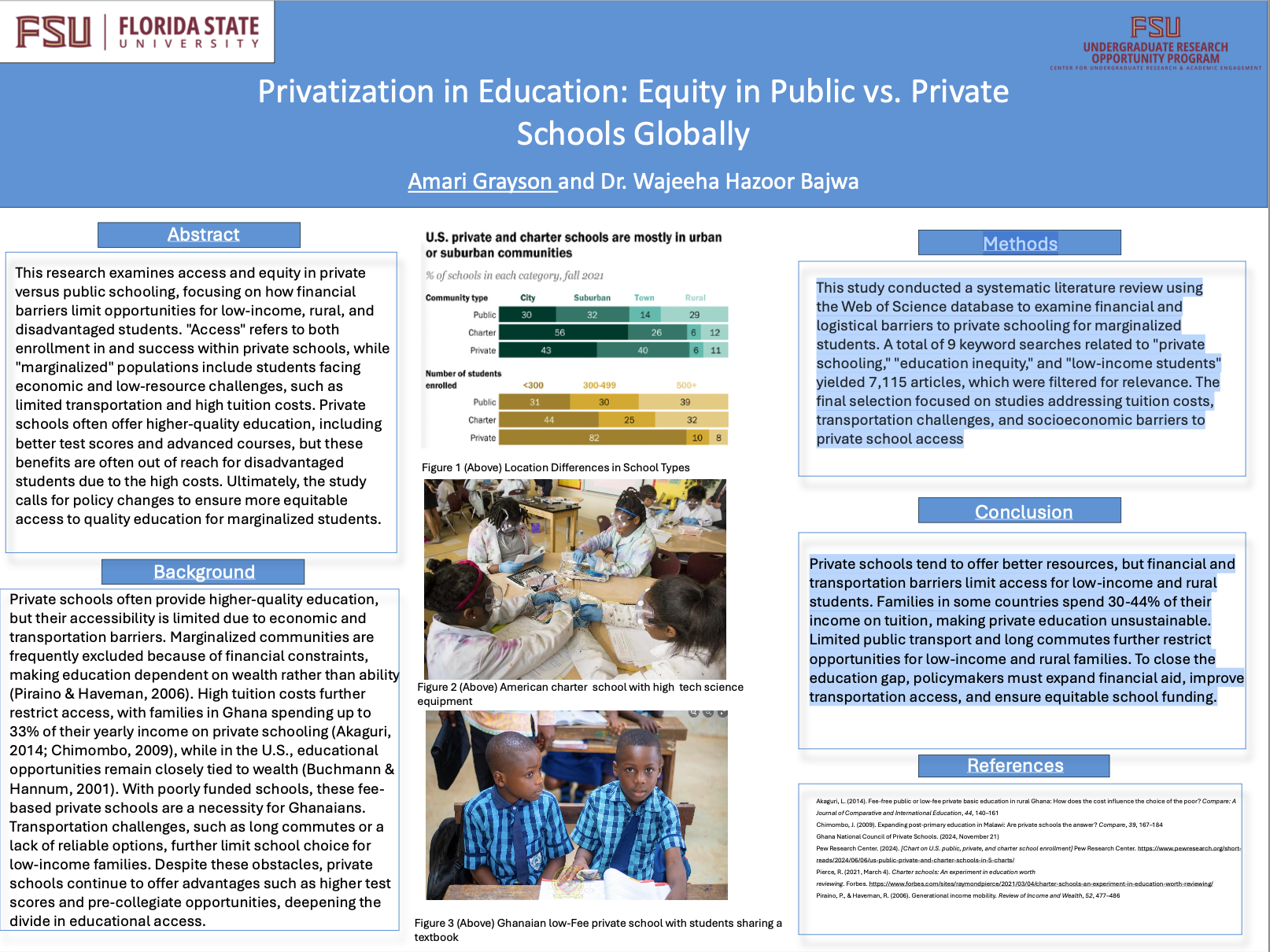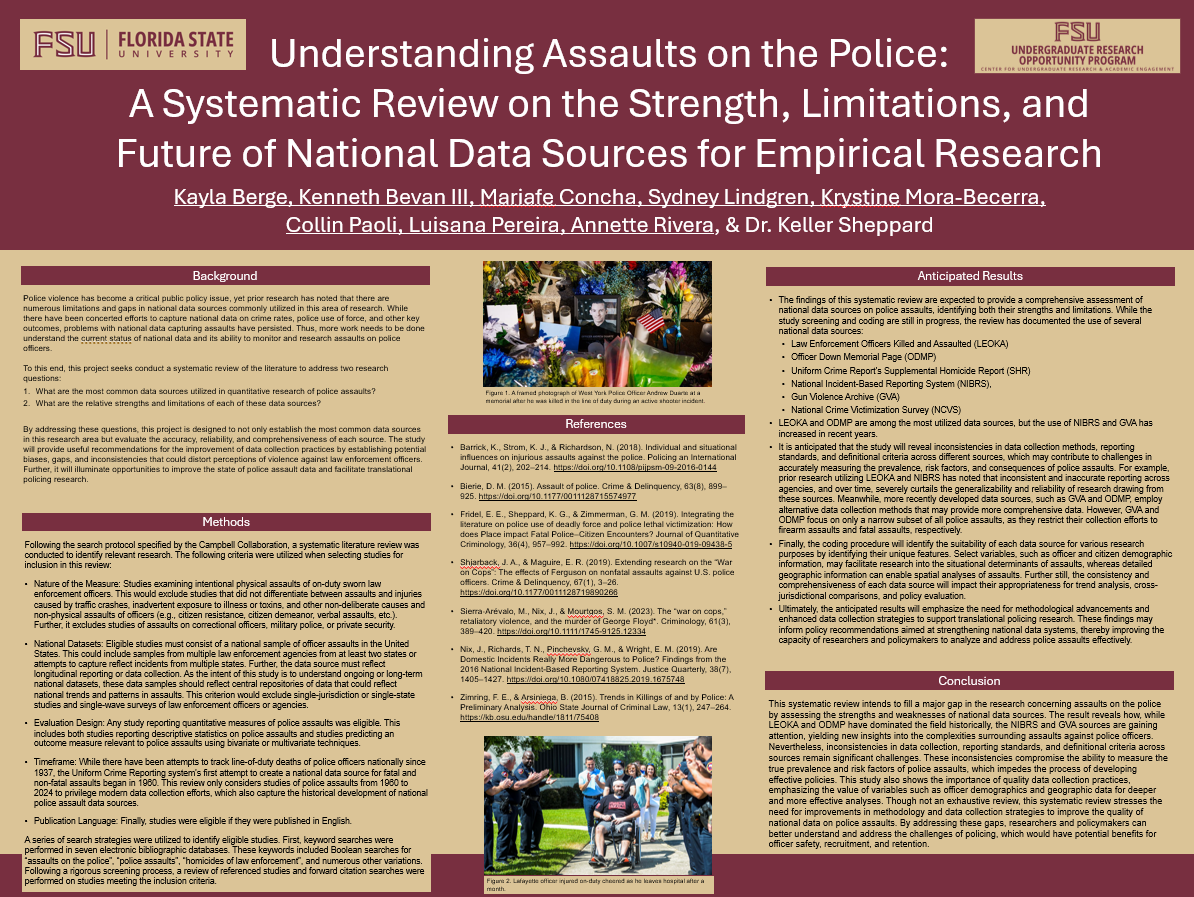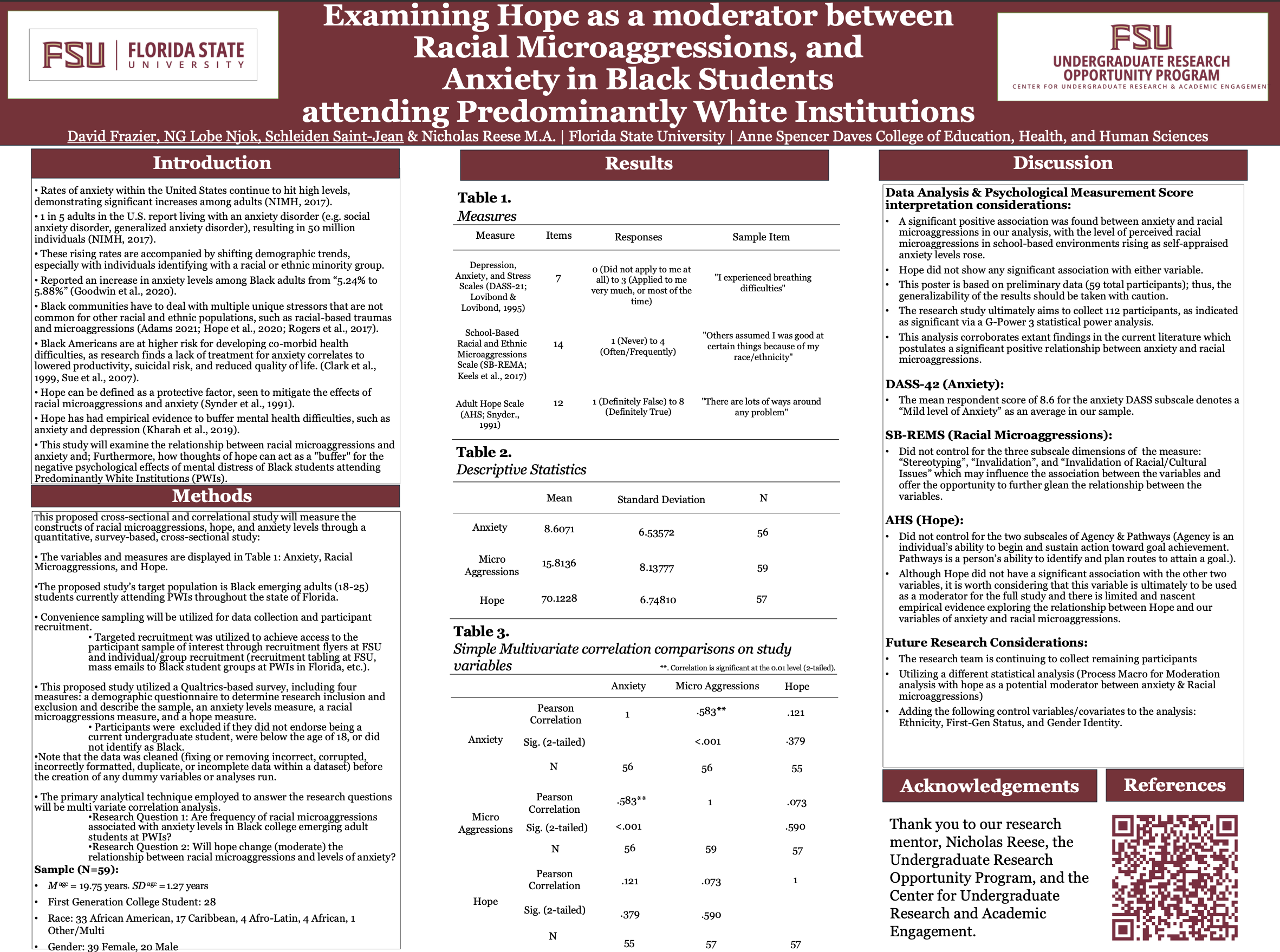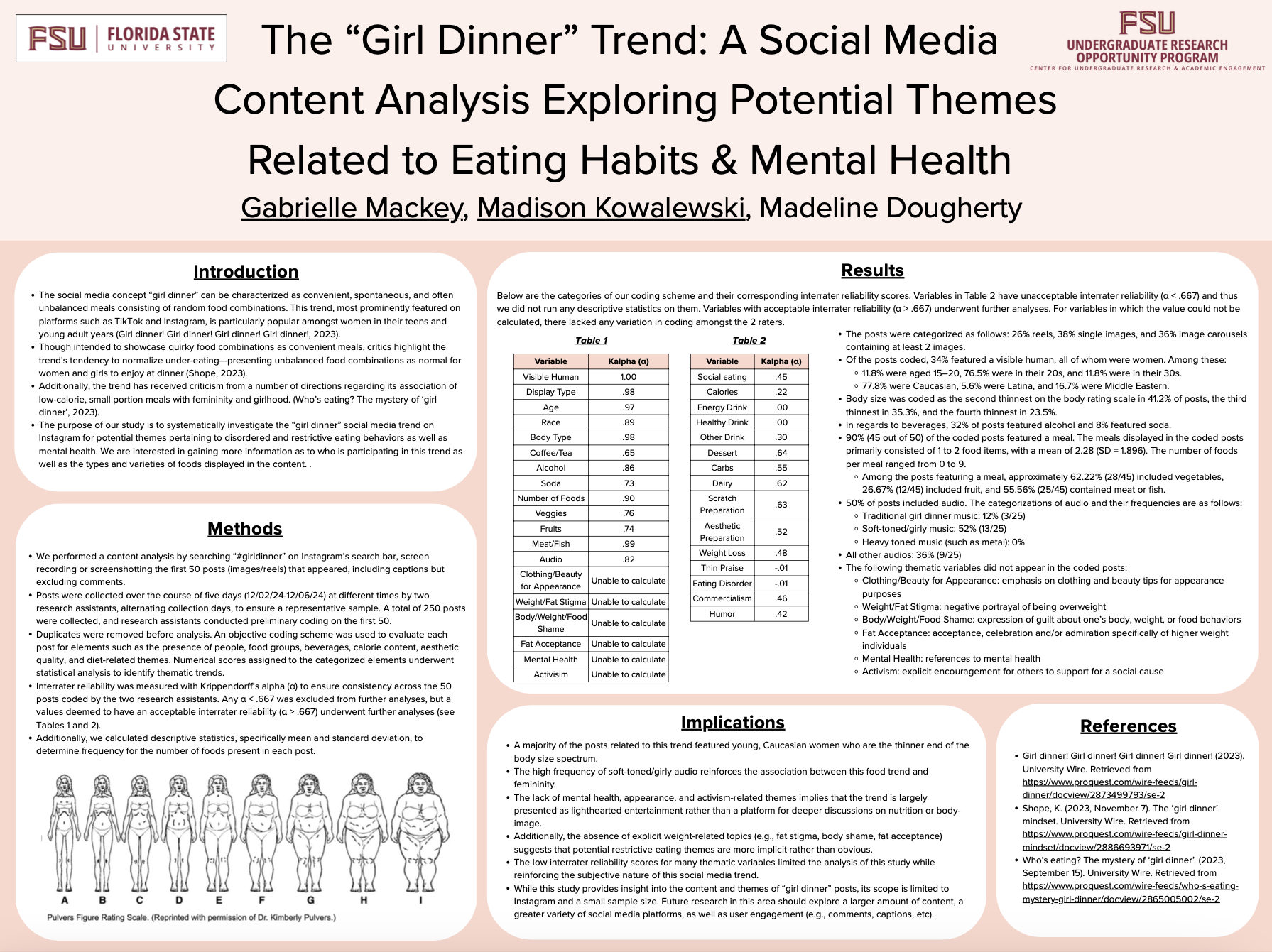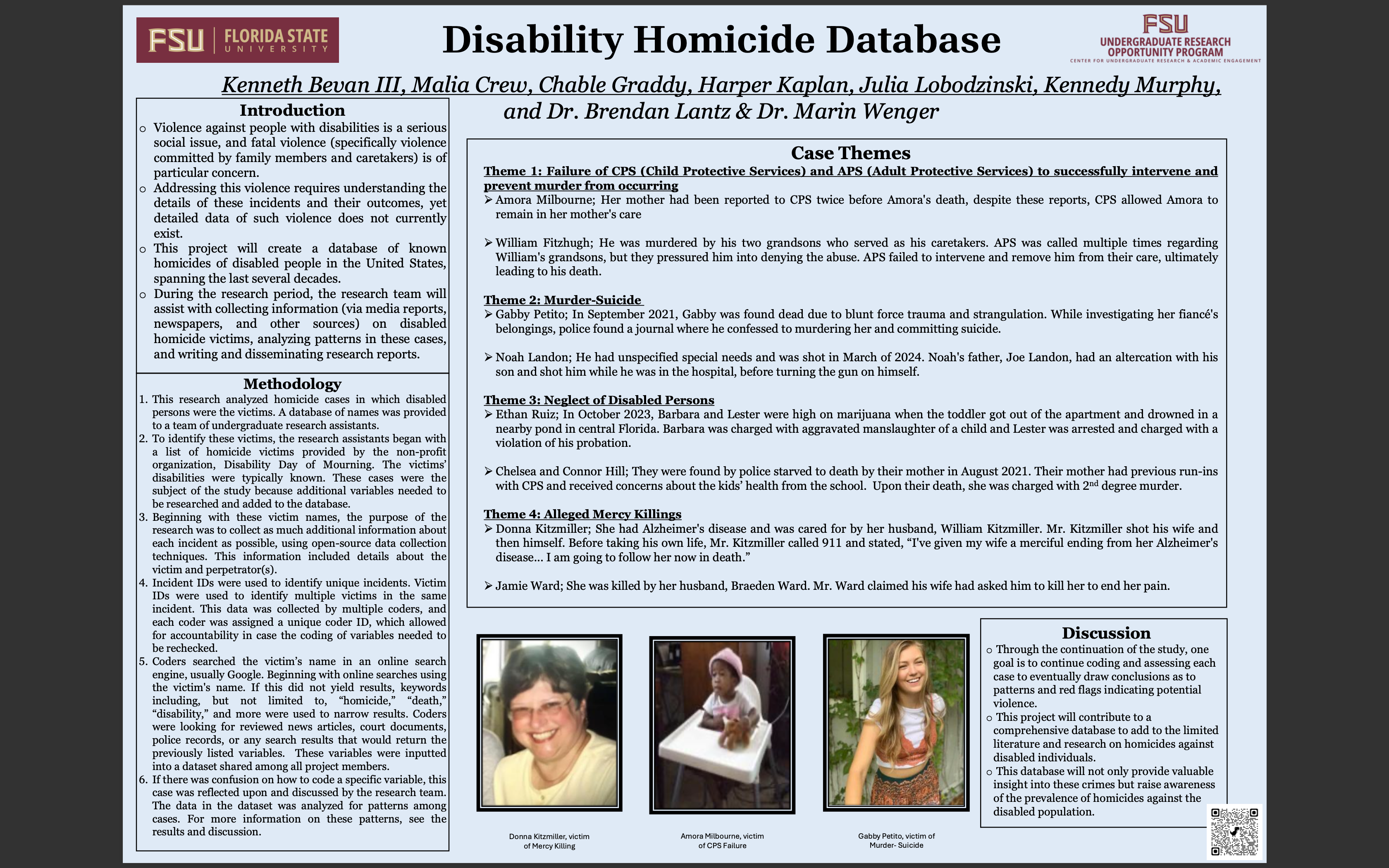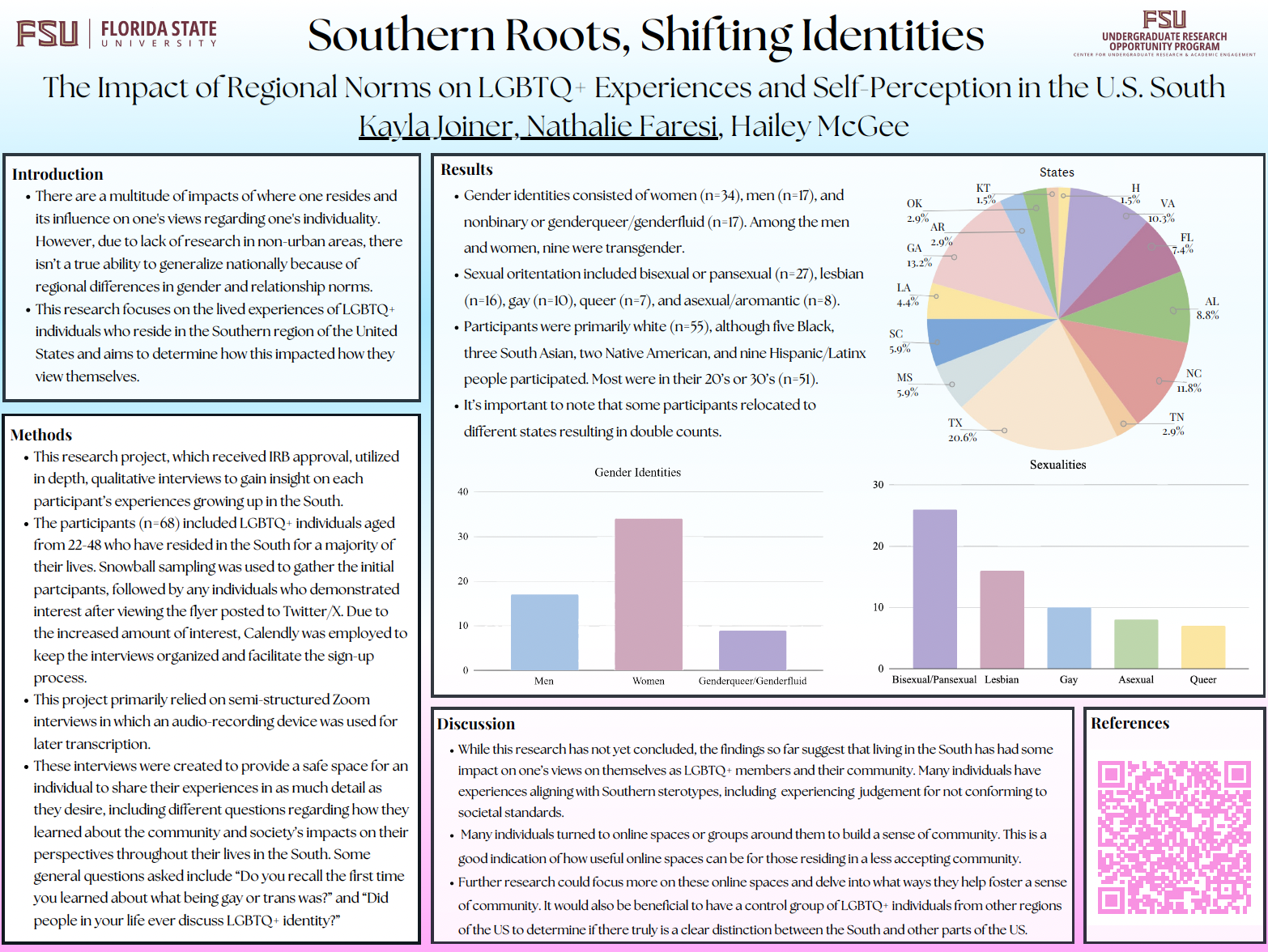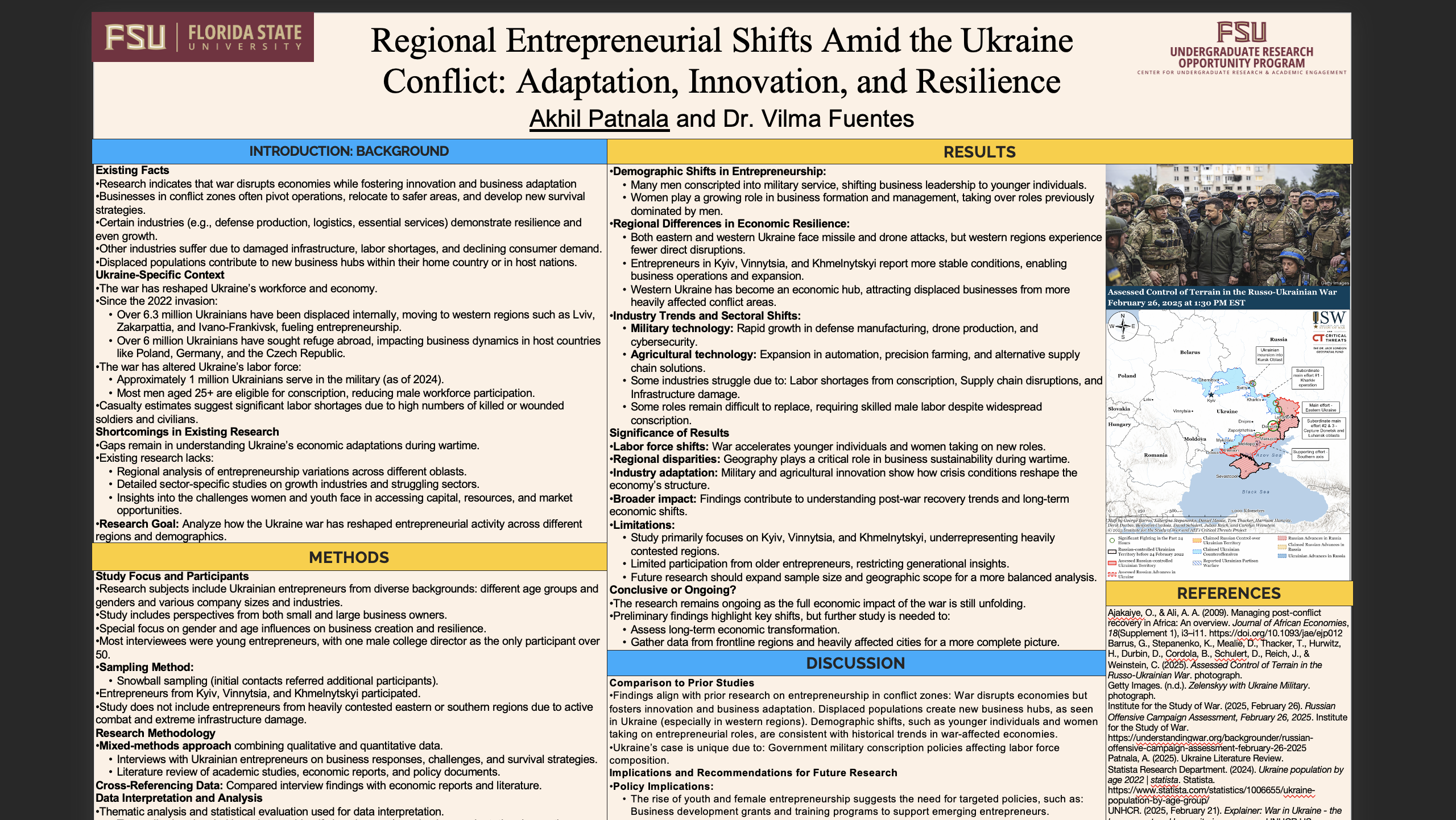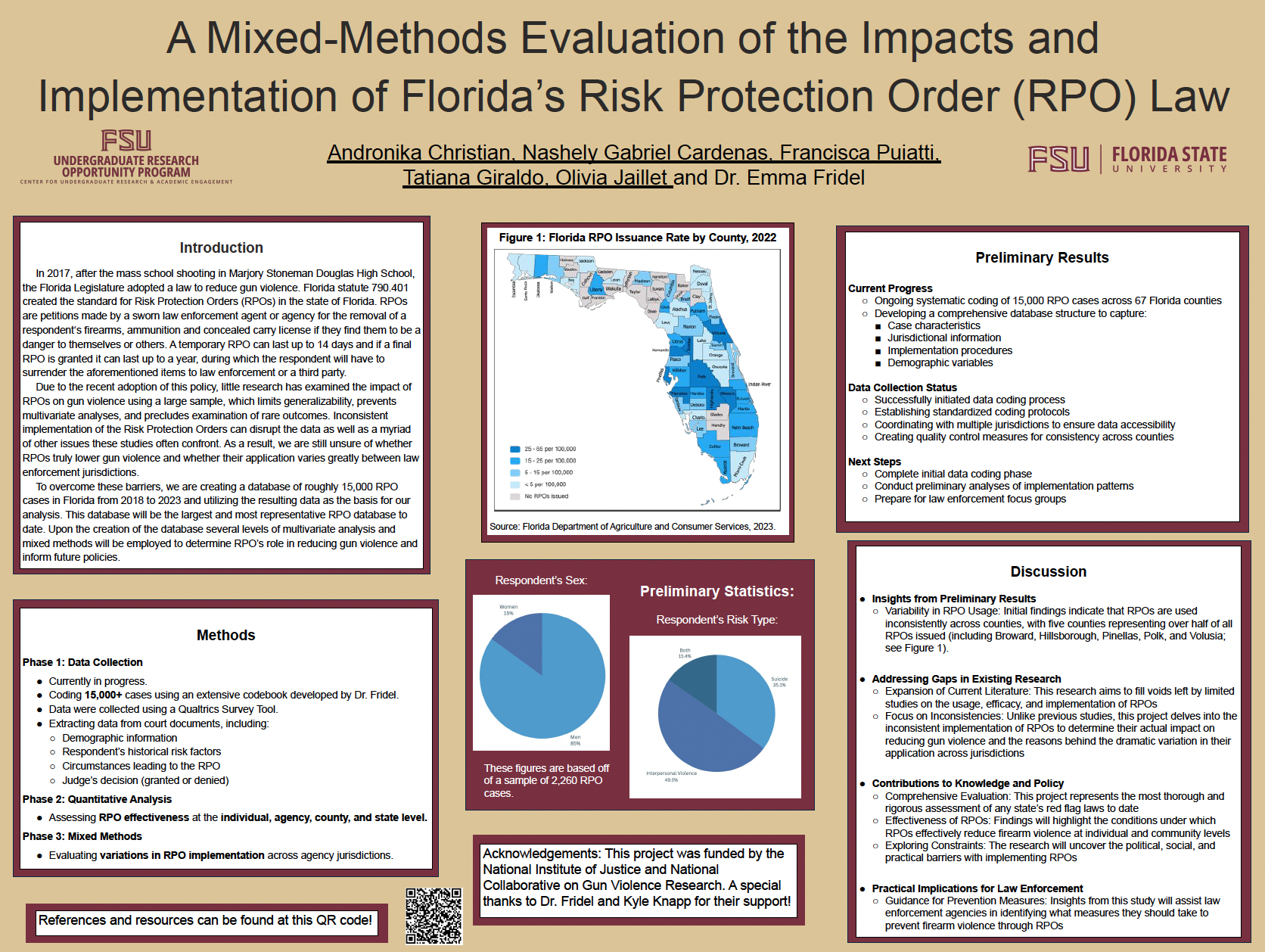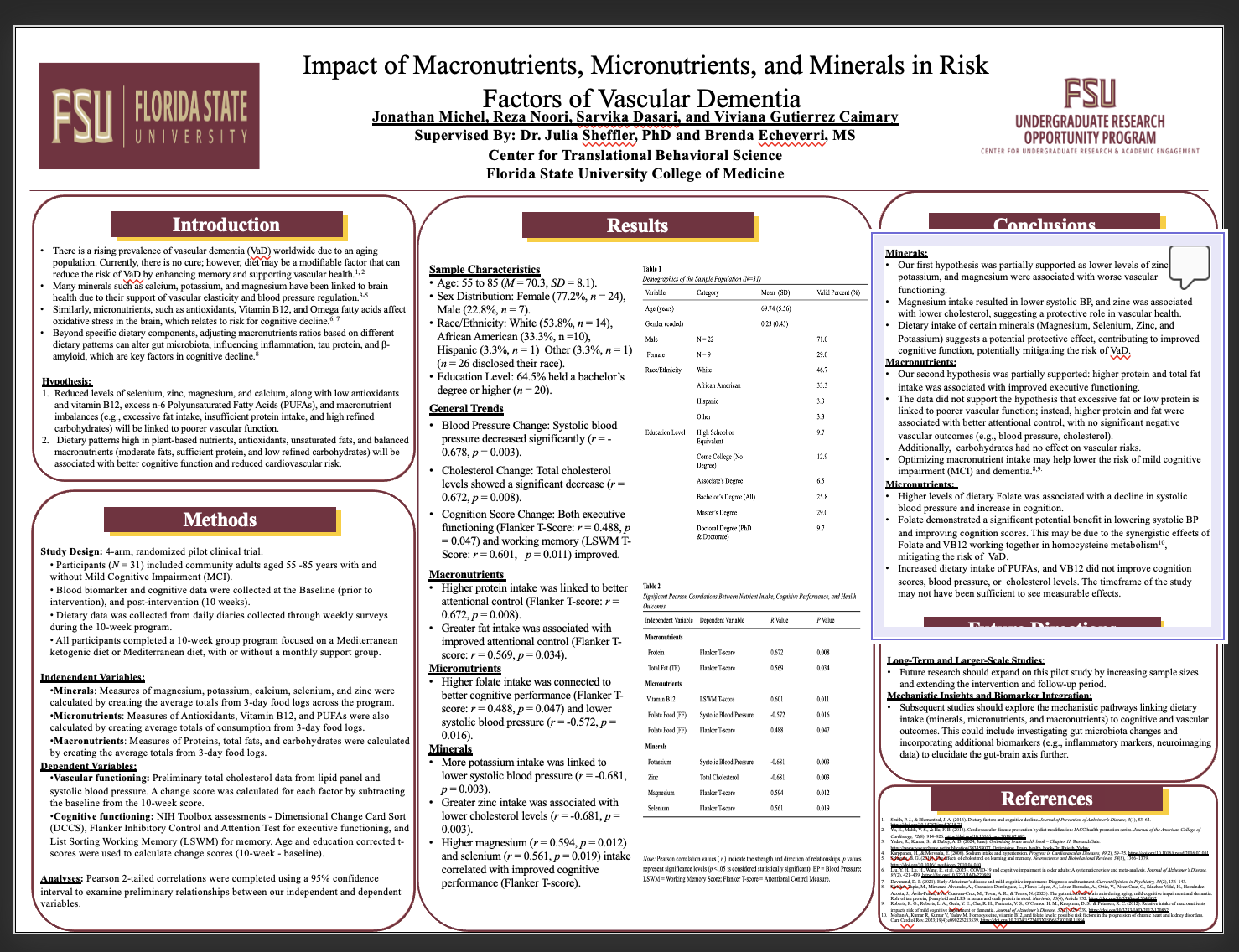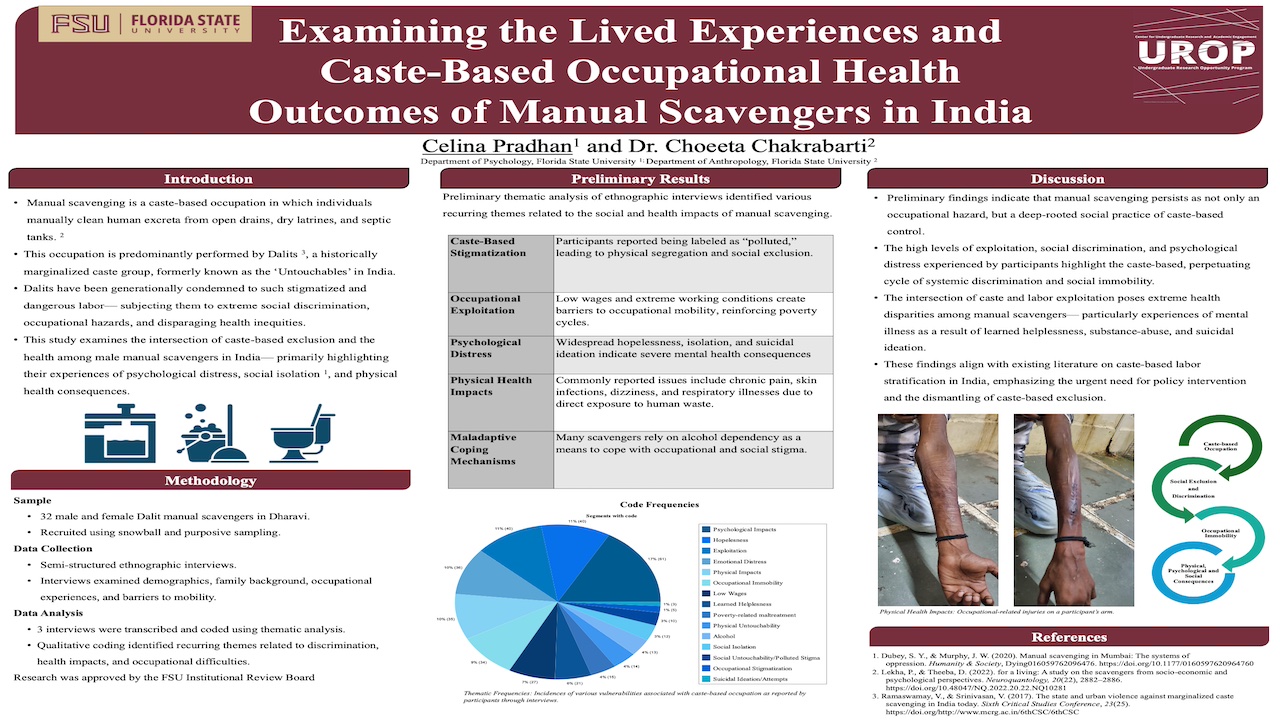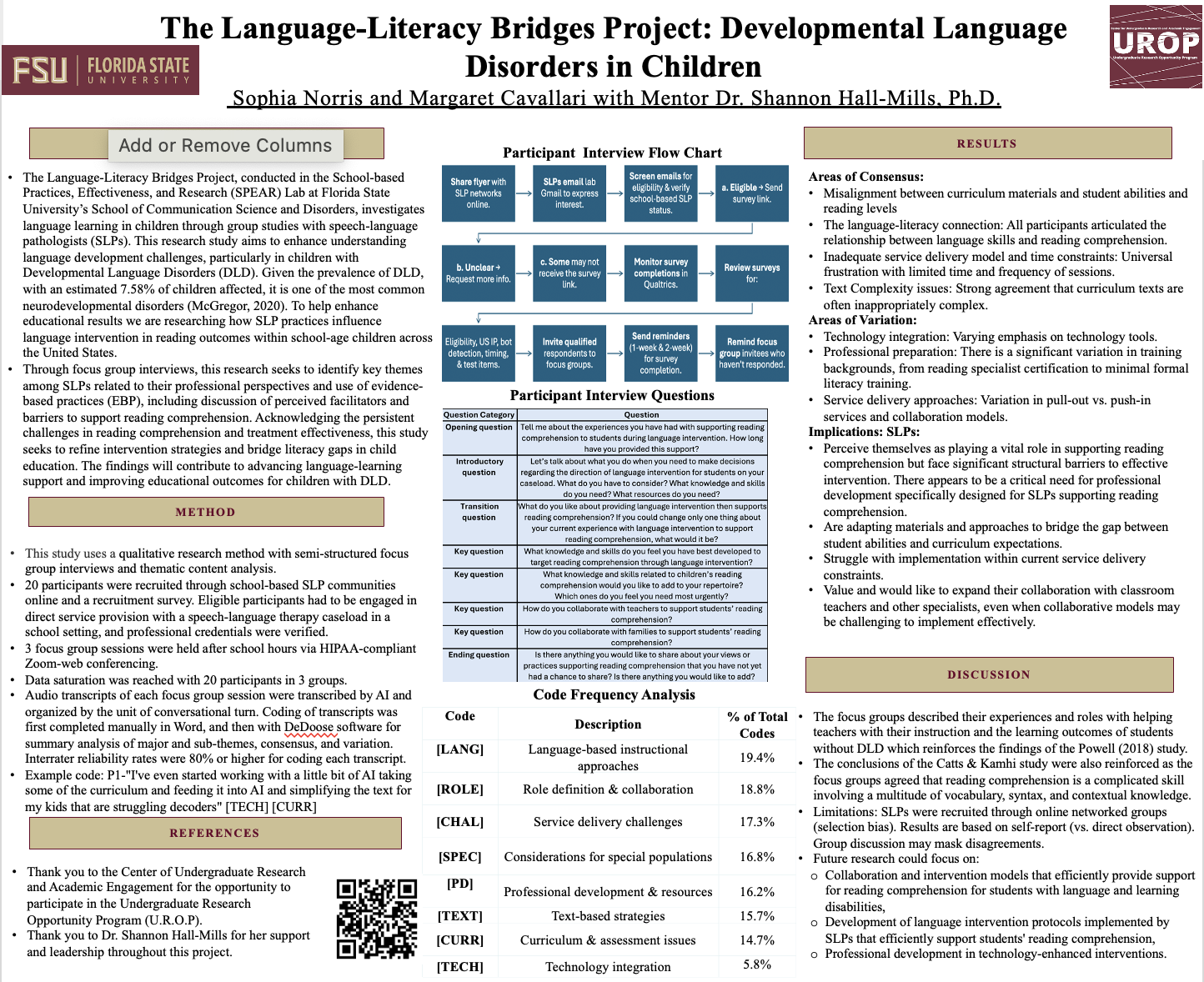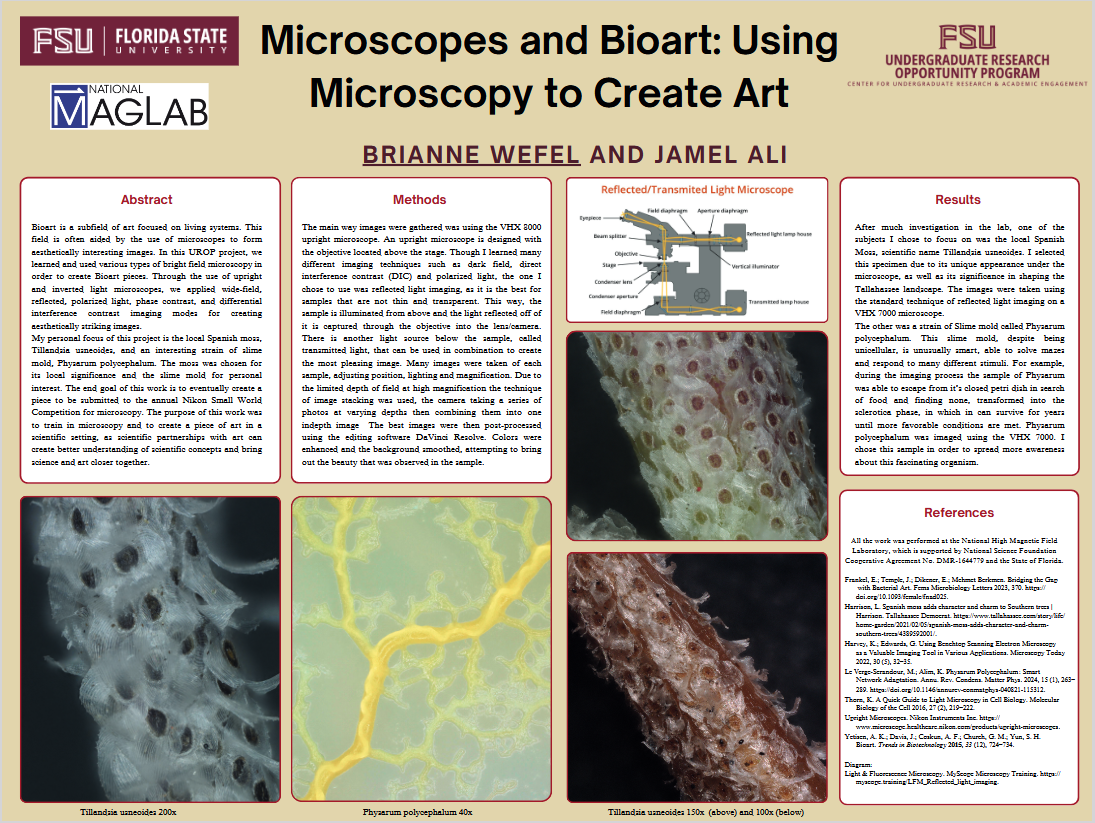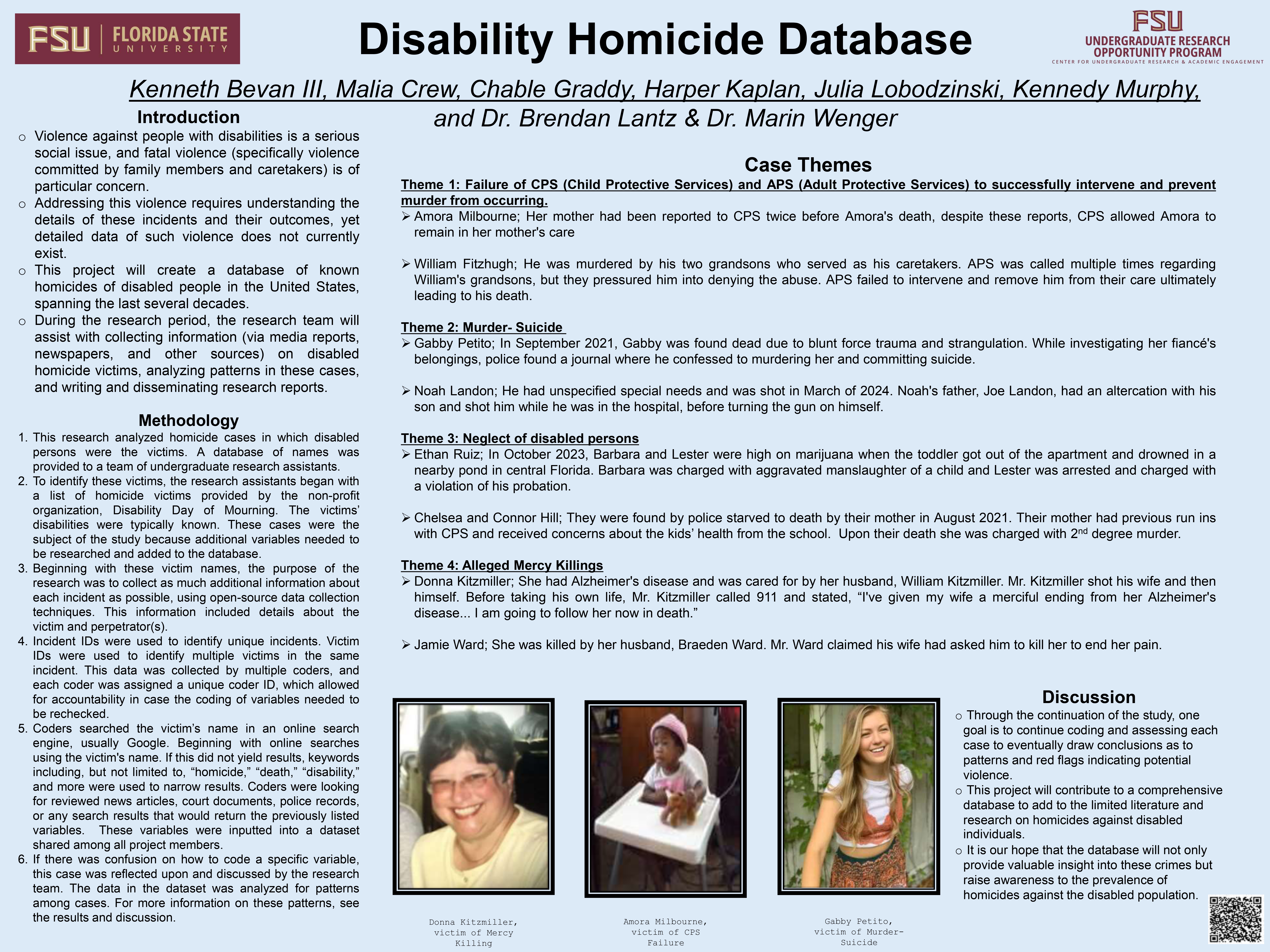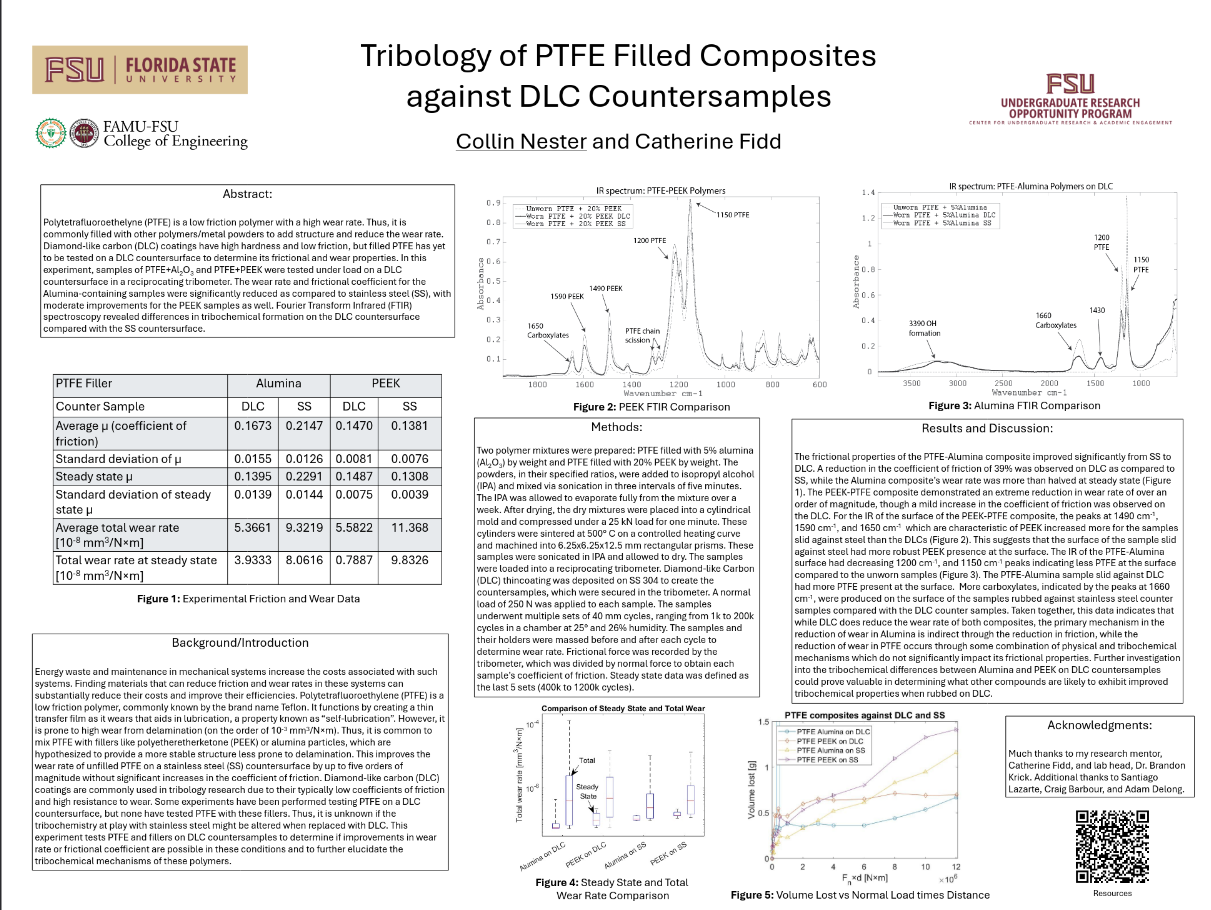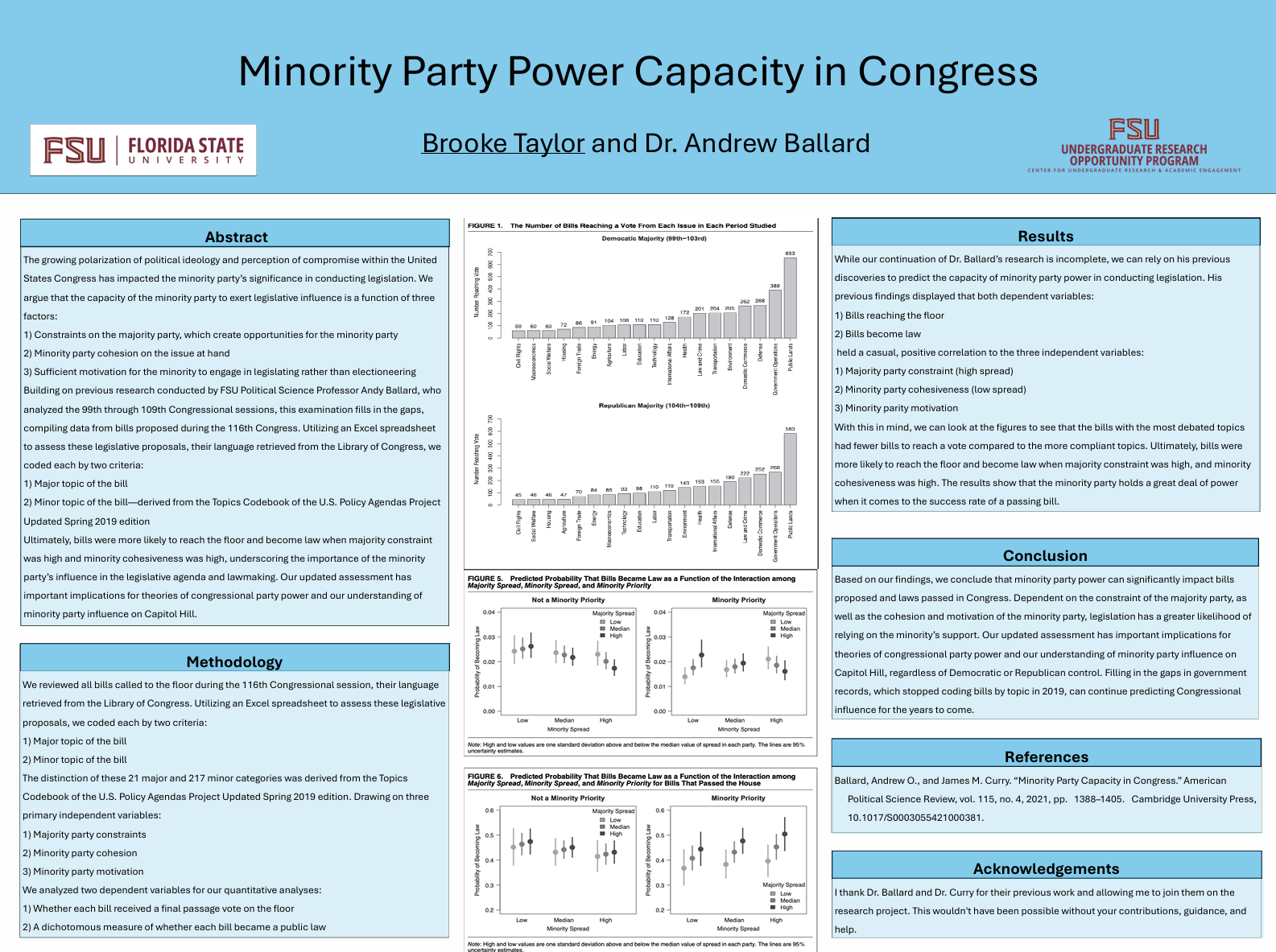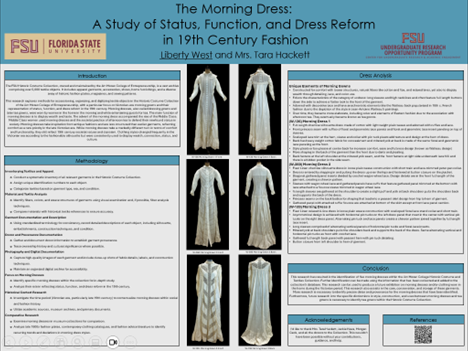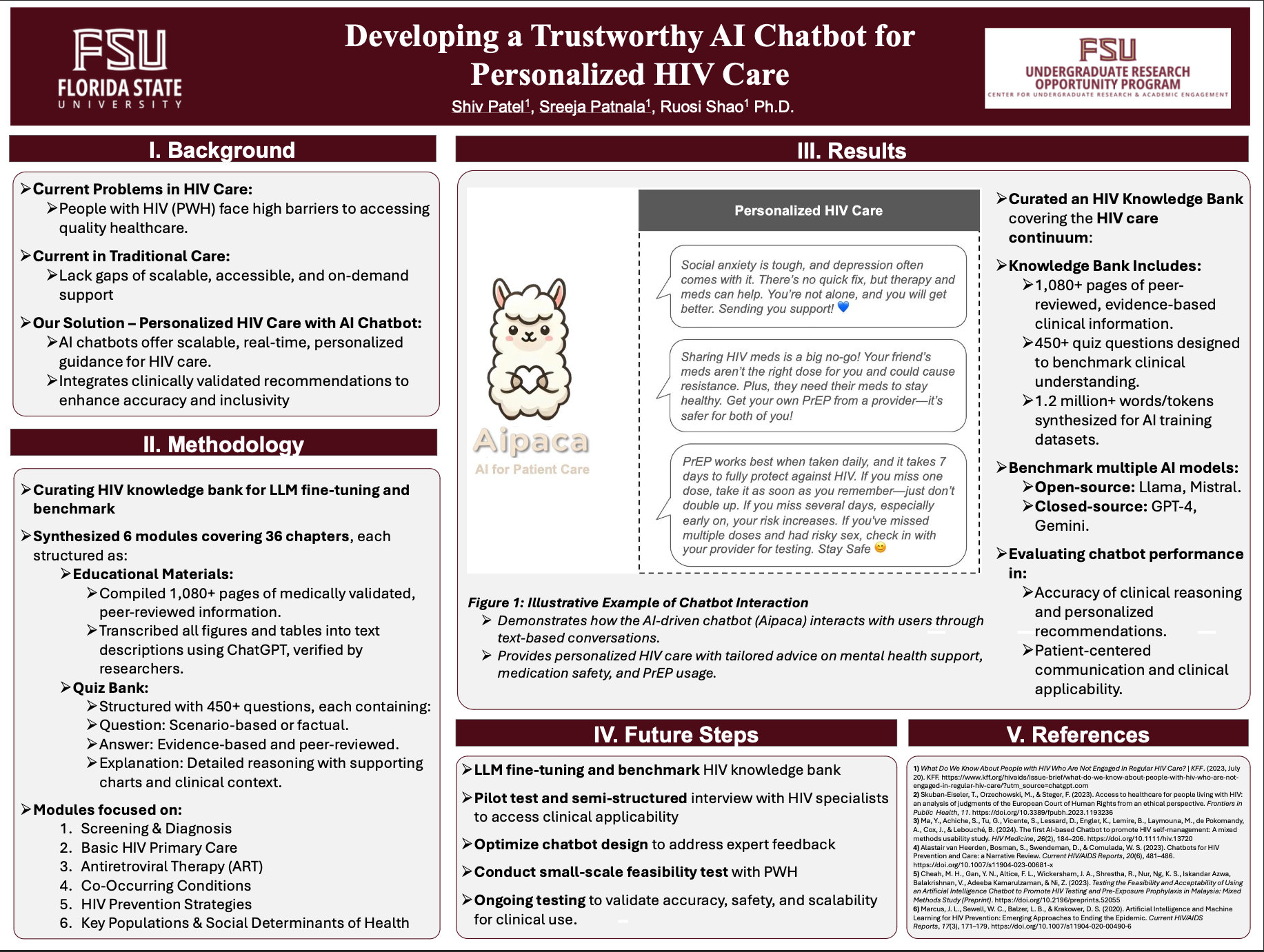Research Symposium
25th annual Undergraduate Research Symposium, April 1, 2025
Krystine Mora-Becerra Poster Session 2: 10:45 am - 11:45 am/ Poster #163
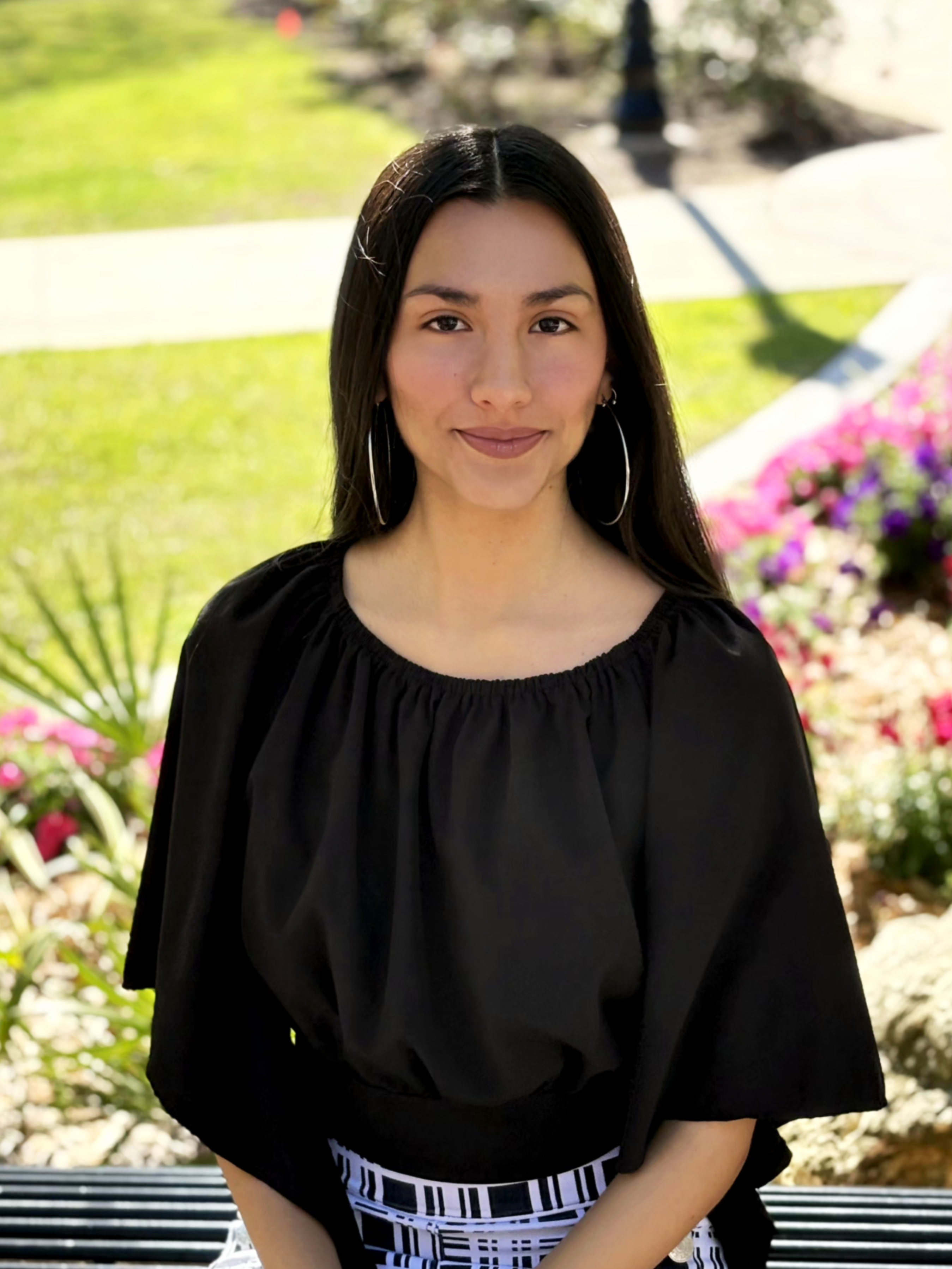
BIO
I am majoring in psychology with a minor in criminology. I am currently a research assistant in a psychology lab here at FSU. I plan to eventually earn either a PhD in Clinical or Forensic Psychology. My ultimate goal however is to pursue a career in forensic psychology.
I was born and grew up in Kissimmee, Florida. I enjoy listening to music, painting, drawing, photography, going to the beach, walking on nature trails, going to amusement parks, and hanging out with friends and family. I went to a performing arts middle/high school where I majored as a creative writer in middle school and then switched to visual arts in high school. Through my art and experiences, I have become a detail-oriented, patient, problem-solving, and creative individual who strives to help those around me by listening and connecting to others. Thus, I wish to apply these skills to my future career in psychology.
Understanding Assaults on the Police: A Systematic Review on the Strength, Limitations, and Future of National Data Sources for Empirical Research
Authors: Krystine Mora-Becerra, Dr. Keller SheppardStudent Major: Psychology
Mentor: Dr. Keller Sheppard
Mentor's Department: Criminology Mentor's College: College of Criminology & Criminal Justice Co-Presenters: Kayla Berge, Mariafe Concha, Sydney Lindgren, Collin Paoli, and Luisana Pereira
Abstract
Assaults on the police represent a pressing public policy issue, especially as law enforcement faces challenges in recruitment and retention due to the unique occupational dangers associated with policing. A growing body of empirical research has sought to understand the prevalence, risk factors, and consequences of these incidents; however, its development is complicated by the limitations of national data sources on police assaults. The aim of this systematic literature review is threefold: (1) assess the prevalence of each national data source on police assaults, (2) synthesize the limitations of these data sources as detailed in prior research, and (3) describe the unique feature of each data source that can facilitate future research. To this end, searches of literature published from January 1960 to September 2024 were performed using a combination of search strategies, such as electronic database searches, reference searches, and forward citation searches. Studies will be screened against a set of inclusion criteria and coded to address the study’s three key research questions. It is anticipated that the results of this study will highlight the key strengths and limitations of current national data on this crucial public policy issue. Further, it will illuminate opportunities to improve the state of police assault data and facilitate translational policing research.
Keywords: assaults, police, systematic review
25th annual Undergraduate Research Symposium, April 1, 2025
Amari Grayson Poster Session 4: 3:00 pm - 4:00 pm/ Poster #31
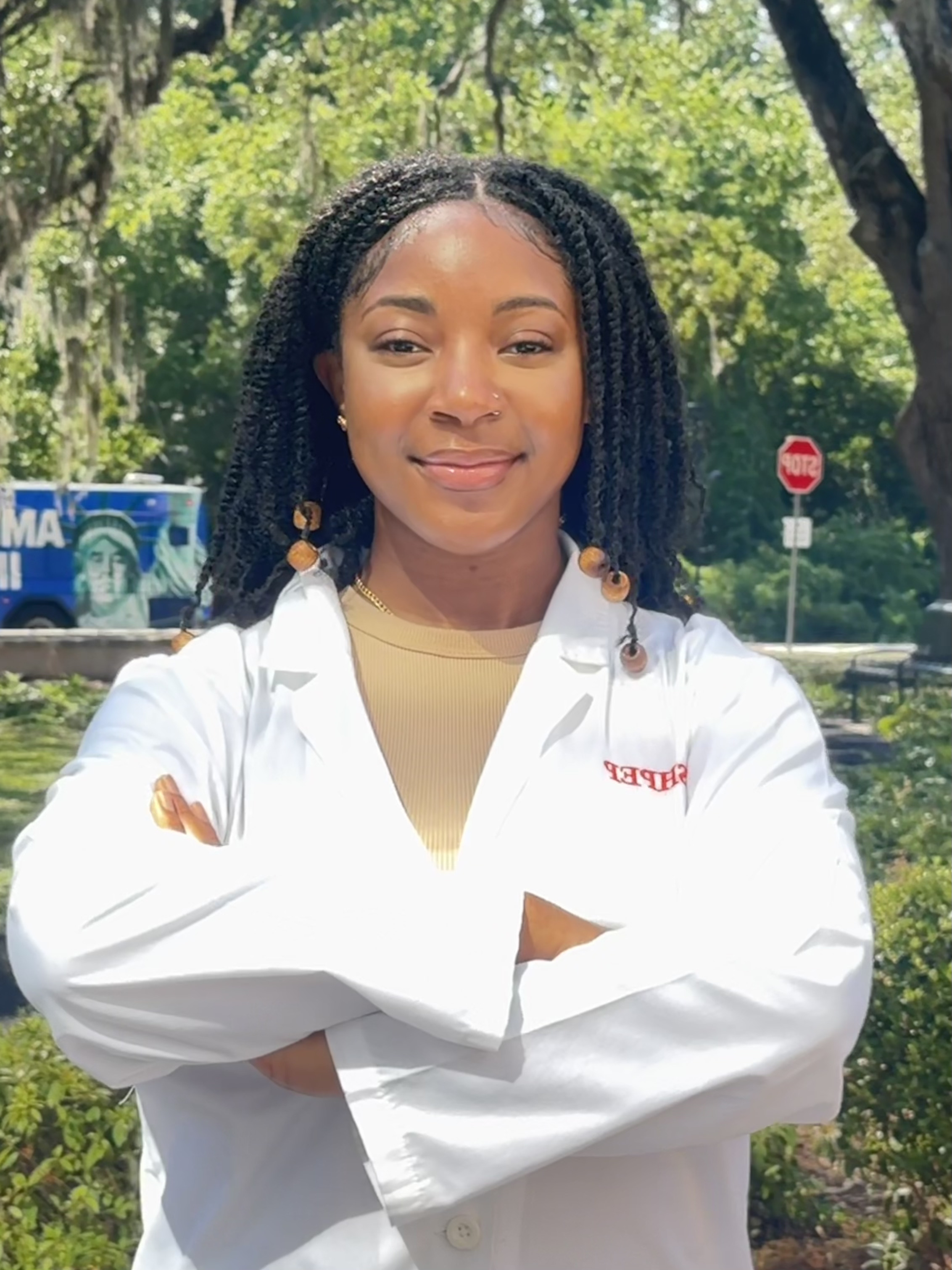
BIO
Amari Grayson is a sophomore at Florida State University, majoring in Public Health, Sociology, on a Pre -Physician Assistant track. Hailing from Saint Petersburg, Florida, Amari is deeply interested in research surrounding the social determinants of health and how they impact both medical and non-medical aspects of patient care. With aspirations to become a physician assistant, Amari is passionate about addressing healthcare disparities and is working toward her goal of establishing a mobile healthcare clinic that provides free and reduced services to rural communities.
Privatization in Education: Equity in Public vs. Private Schools Globally
Authors: Amari Grayson, Dr. Wajeeha Hazoor BajwaStudent Major: Public Health and Sociology
Mentor: Dr. Wajeeha Hazoor Bajwa
Mentor's Department: Office of Research Mentor's College: Education, Health, and Human Sciences Co-Presenters:
Abstract
This research examines access and equity in private
versus public schooling, focusing on how financial
barriers limit opportunities for low-income, rural, and
disadvantaged students. "Access" refers to both
enrollment in and success within private schools, while
"marginalized" populations include students facing
economic and low-resource challenges, such as
limited transportation and high tuition costs. Private
schools often offer higher-quality education, including
better test scores and advanced courses, but these
benefits are often out of reach for disadvantaged
students due to the high costs. Ultimately, the study
calls for policy changes to ensure more equitable
access to quality education for marginalized students.
Keywords: Private Schooling,Equity Education, Inequality
25th annual Undergraduate Research Symposium, April 1, 2025
Kayla Berge Poster Session 4: 3:00 pm - 4:00 pm/ Poster #163
BIO
Hello! My name is Kayla, and I am a Cuban-American student from Miami, FL. I am pursuing a dual degree in Criminology and Psychology with minors in Crime Scene Investigation and Public Administration. I am currently studying National Data Sets, and how well they report law enforcement officers who have been killed or assaulted while on duty. Additionally, I work as an investigative intern at the Gadsden County Public Defender’s Office, where I where I assist attorneys by conducting intake interviews and gathering information for defense strategies. Some of my research interests include forensic psychology, criminal behavior, and the intersection of psychology and the justice system. I aspire to earn a Ph.D. in Clinical Psychology with a concentration in Forensic Psychology.
Understanding Assaults on the Police: A Systematic Review on the Strength, Limitations, and Future of National Data Sources for Empirical Research
Authors: Kayla Berge, Dr. Keller SheppardStudent Major: Criminology and Psychology
Mentor: Dr. Keller Sheppard
Mentor's Department: Criminology Mentor's College: College of Criminology and Criminal Justice Co-Presenters: Kenneth Bevan III, Mariafe Concha, Sydney Lindgren, Krystine Mora-Becerra, Collin Paoli, Luisana Pereira and Annette Rivera
Abstract
Assaults on the police represent a pressing public policy issue, especially as law enforcement faces challenges in recruitment and retention due to the unique occupational dangers associated with policing. A growing body of empirical research has sought to understand the prevalence, risk factors, and consequences of these incidents; however, its development is complicated by the limitations of national data sources on police assaults. The aim of this systematic literature review is threefold: (1) assess the prevalence of each national data source on police assaults, (2) synthesize the limitations of these data sources as detailed in prior research, and (3) describe the unique feature of each data source that can facilitate future research. To this end, searches of literature published from January 1960 to September 2024 were performed using a combination of search strategies, such as electronic database searches, reference searches, and forward citation searches. Studies will be screened against a set of inclusion criteria and coded to address the study’s three key research questions. It is anticipated that the results of this study will highlight the key strengths and limitations of current national data on this crucial public policy issue. Further, it will illuminate opportunities to improve the state of police assault data and facilitate translational policing research.
Keywords: Law enforcement, Assaults, Data-sets
25th annual Undergraduate Research Symposium, April 1, 2025
Nigel-Ginola "NG" Njok Poster Session 3: 1:45 pm - 2:45 pm / Poster #67

BIO
Hello! I am Nigel-Ginola "NG" Njok, a first-year Behavioral Neuroscience major from Palm Coast, FL. Throughout my time at Florida State, I aim to get involved in research relating to the underlying biological mechanisms for psychological and mental disorders. More specifically, how to better improve and develop tailored mental health treatments for individuals. Following my undergraduate studies, I plan attend medical school to become a psychiatrist or attend a PhD program for clinical neuroscience. Outside of academia, I enjoy playing the violin, thrifting, and listening to soul/R&B music.
Examining Hope as a moderator between Racial Microaggressions, and Anxiety in Black Students attending Predominantly White Institutions
Authors: Nigel-Ginola "NG" Njok, Nicholas ReeseStudent Major: Behavioral Neuroscience
Mentor: Nicholas Reese
Mentor's Department: Counseling Psychology and School Psychology Mentor's College: Anne Spencer Daves College of Education, Health, and Human Sciences Co-Presenters: David Frazier, Schleiden Saint-Jean
Abstract
This study examines the relationship between racial microaggressions and anxiety levels among Black students attending Predominantly White Institutions (PWIs), with hope investigated as a potential moderating factor. The research addresses critical gaps in anxiety research for Black populations, particularly given the increasing prevalence of anxiety disorders and the unique stressors faced by Black college students. Using Racial Battle Fatigue theory and Snyder's Hope Theory as theoretical frameworks, the study employs a correlational cross-sectional design to investigate two primary research questions: (1) whether the frequency of racial microaggressions is associated with anxiety levels in Black college emerging adult students at PWIs, and (2) if hope moderates the relationship between racial microaggressions and anxiety levels. The study controls for ethnicity and first-generation status, as these variables have been shown to interconnect with both racial microaggressions and anxiety in Black populations. This research aims to contribute to the development of culturally tailored interventions and expand the empirical understanding of anxiety in Black college students, addressing a significant gap in mental health literature and practice. The findings have important implications for Health Service Psychology practitioners working with Black college students and could inform more effective, culturally-sensitive treatment approaches.
Keywords: Psychology, Racial Microaggressions, Anxiety, Mental Afflictions
25th annual Undergraduate Research Symposium, April 1, 2025
Maddi Kowalewski Poster Session 1: 9:30 am - 10:30 am/ Poster #175
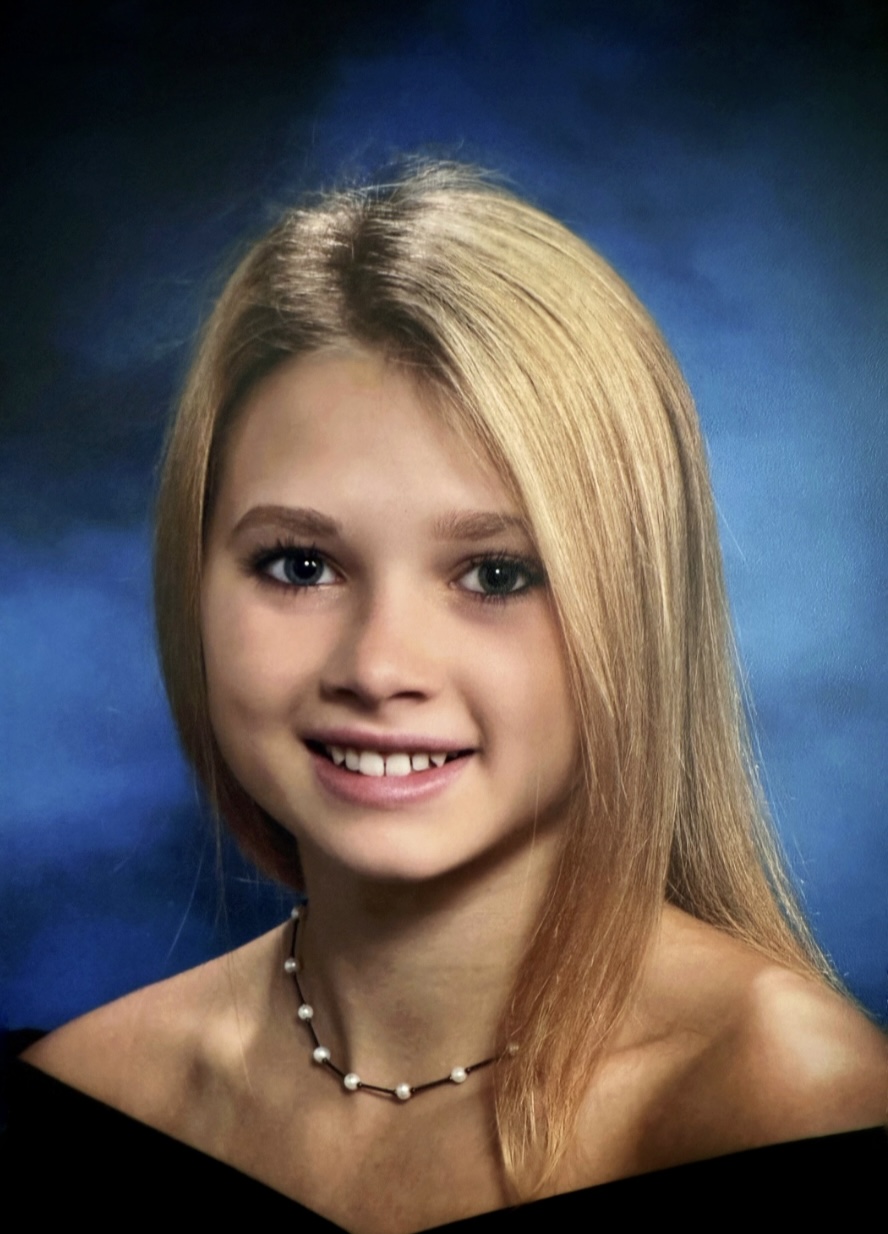
BIO
My name is Maddi Kowalewski, and I am from Atlanta, Georgia. I am a sophomore majoring in psychology and part of the Honors Program. I plan to pursue a PhD in clinical psychology with a focus on forensic applications in correctional and institutional settings. My research interests include psychology and criminology.
The “Girl Dinner” Trend: A Social Media Content Analysis Exploring Potential Themes Related to Eating Habits & Mental Health
Authors: Maddi Kowalewski, Madeline DoughertyStudent Major: Psychology
Mentor: Madeline Dougherty
Mentor's Department: Psychology Mentor's College: College of Arts and Sciences Co-Presenters: Gabrielle Mackey
Abstract
The social media trend “girl dinner” features convenient, spontaneous, and often unbalanced meals consisting of random food combinations. Popular among young women on platforms like TikTok and Instagram, it has been criticized for normalizing under-eating and reinforcing associations between femininity and low-calorie meals. The present study systematically analyzes Instagram’s “girl dinner” trend to identify potential themes related to disordered eating behaviors and mental health. A content analysis was conducted by collecting 250 Instagram posts tagged with “#girldinner” over five days. Posts, including captions but excluding comments, were recorded and screened for duplicates. Research assistants coded the first 50 posts using an objective coding scheme evaluating demographic characteristics of people in the video, types of foods and beverages consumed, aesthetic quality, and disordered eating and mental health-related themes. Interrater reliability was assessed using Krippendorff’s alpha (α), with α > .667 considered acceptable. Frequencies were calculated for all acceptable variables, and mean and standard deviation were computed for the number of foods per post. Due to approximately 44% of coded variables lacking acceptable interrater reliability, findings are limited. No definitive themes related to disordered eating or mental health emerged, but we obtained demographic insights into trend participants and common food choices. Since “girl dinner” content is subjective, raising awareness of its potential unintended negative messages is crucial, particularly given younger audiences' susceptibility to social media influence.
Keywords: mental health, social media, eating disorders, social media trends, girl dinner
25th annual Undergraduate Research Symposium, April 1, 2025
Kenneth Bevan III Poster Session 3: 1:45 pm - 2:45 pm/ Poster #167
BIO
My name is Kenneth Bevan. I am a senior majoring in Cyber Criminology at Florida State University’s College of Criminology and Criminal Justice. I was born and raised in Orlando, Florida. Upon completing my graduate degree, I intend to work with the Orlando Police Department. After gaining experience in local-level policing, I aspire to join the Federal Bureau of Investigation’s Counter Cyber Terrorism Task Force. I am confident that my skills and experiences would enable me to contribute positively to the cyber security landscape of the United States.
Disability Homicide Database
Authors: Kenneth Bevan III, Dr. Brendan LantzStudent Major: Cyber Criminology
Mentor: Dr. Brendan Lantz
Mentor's Department: Criminology Mentor's College: College of Criminology and Criminal Justice Co-Presenters: Malia Crew, Chable Graddy, Harper Kaplan, Julia Lobodzinski, and Kennedy Murphy
Abstract
Violence against individuals with disabilities is a significant social issue, with fatal incidents—specifically those committed by family members or caretakers—being of particular concern. Addressing this violence requires a comprehensive understanding of these incidents; however, detailed data on such cases is currently lacking. This research project aims to fill this gap by developing a database of known homicides of disabled individuals in the United States over several decades. Researchers compiled data using open source data collection techniques, including collecting data from media reports, police records, social media, and obituaries, coding cases based on variables such as age, location, race, gender, type of violence, criminal history, and warning signs. The goal was to reach data saturation, ensuring the most complete picture of each case. This dataset enables pattern analysis through data analytics and research reports, providing patterns that can inform strategies to protect individuals with disabilities. Key indicators, such as prior criminal history or past child protective services involvement, can help law enforcement identify and intervene in high-risk situations before violence occurs. In the next phase, this project will continue gathering data and refining its approach seeking out common themes to better understand and prevent violence against individuals with disabilities. Collaboration with policymakers and law enforcement will play a crucial role in strengthening protective measures and addressing systemic gaps. Through ongoing analysis and public awareness efforts, this research aims to drive meaningful change and build a safer, more just society for individuals with disabilities.
Keywords: homicide, criminology, disability, violence, database
25th annual Undergraduate Research Symposium, April 1, 2025
Kayla Joiner Poster Session 4: 3:00 pm - 4:00 pm/ Poster #155
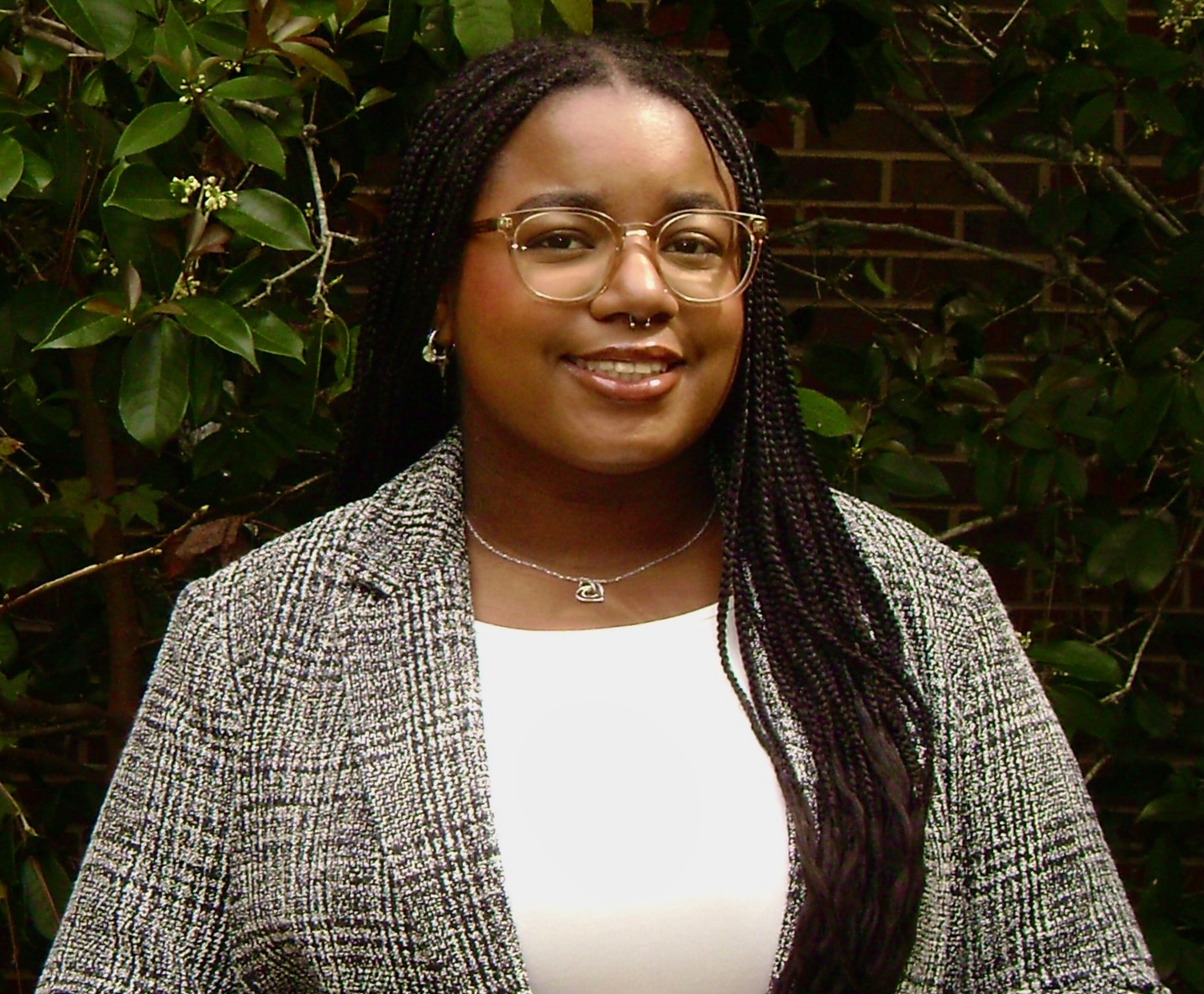
BIO
I am a first-year student at Florida State University from Sunrise, FL. I am studying Psychology with a minor in Criminology. Through my experiences with mental health services, I plan to pursue a PhD in clinical psychology to persuade others in need to seek mental health resources and contribute to the field. In my time at FSU, I hope to learn more about and participate in research on the subfields of clinical psychology, such as personality and eating disorders.
Southern Roots, Shifting Identities: The Impact of Regional Norms on LGBTQ+ Experiences and Self-Perception in the U.S. South
Authors: Kayla Joiner, Hailey McGeeStudent Major: Psychology
Mentor: Hailey McGee
Mentor's Department: Sociology Mentor's College: Social Sciences & Public Policy Co-Presenters: Nathalie Faresi
Abstract
There are a multitude of impacts of where one resides and its influence on one's views regarding one's individuality. This research focused on the lived experiences of LGBTQ+ individuals who reside in the Southern region of the United States and aimed to determine how this impacted how they view themselves. We are investigating this due to the lack of sociological research on LGBTQ+ people in non-urban areas such as Chicago.
Due to the lack of research, there isn’t a true ability to generalize nationally because of regional differences in gender and relationship norms. To investigate this theory, 68 people were interviewed over Zoom after responding to an interview inquiry on various social media networks such as X/Twitter.
In these interviews, participants were asked about their view of the South and other states, the first time they’d heard of the LGBTQ+ community, if they experienced any community or religious pressures, and how this has impacted them from childhood on.
Our interviews found that living in the South has influenced religious beliefs and affected how participants felt welcomed in their communities. Various participants stayed in the South but moved to more urban and accepting areas. Many individuals also turned to online spaces to build a sense of community where they could outwardly express themselves and relate to those around them.
Further studies could expand on rural areas in states that are considered more open-minded, such as Washington.
Keywords: LGBTQ, US, Identity, Interviews
25th annual Undergraduate Research Symposium, April 1, 2025
Maddox Jordan Poster Session 1: 9:30 am - 10:30 am/ Poster #86

BIO
My name is Maddox Jordan, and I am a sophomore Mechanical Engineering student, as well as an honors student. I'm from St. Johns, Florida, and have really enjoyed my first research opportunity at FSU through the UROP program. Being able to work in a tribology lab has helped me to understand how the concepts I have been learning can be applied in real world applications. I hope to continue my research after the conclusion of UROP, and learn even more about the field of tribology.
Characterization of MoS2 in Extreme Environments
Authors: Maddox Jordan, Adam DelongStudent Major: Mechanical Engineering
Mentor: Adam Delong
Mentor's Department: FL CTR for ADV Aero-propulsion (FCAAP) 283000 Mentor's College: FAMU-FSU College of Engineering Co-Presenters:
Abstract
Molybdenum Sulfide (MoS2) is a dry lubricant that can endure extremely low pressure. Due to its low friction properties in vacuum environments, it is used in space environments. MoS2 has potential to be used in low temperature applications, like space. To evaluate the behavior of MoS2 at lower temperatures, we tested the wear and friction of the film at 20°C and -60°C. All samples were made by sputtering MoS2 onto 440C steel substrates. Friction experiments were conducted on a custom linear reciprocating tribometer with a temperature-controlled stage. A Scanning White Light interferometer (SWLI) was used to measure the volume of material removed during an experiment. The tribological properties of MoS2 at 20°C and -60C are displayed in this poster.
Keywords: MoS2, Tribology, Lubricant
25th annual Undergraduate Research Symposium, April 1, 2025
Akhil Patnala Poster Session 2: 10:45 am - 11:45 am/ Poster #269
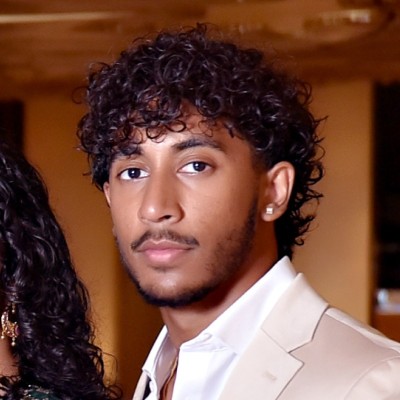
BIO
Political science and finance student at Florida State University. Focused on development and impact.
Regional Entrepreneurial Shifts Amid the Ukraine Conflict: Adaptation, Innovation, and Resilience
Authors: Akhil Patnala, Dr. Vilma FuentesStudent Major: Political Science and Finance
Mentor: Dr. Vilma Fuentes
Mentor's Department: Learning Systems Institute (LSI) Mentor's College: N/A Co-Presenters:
Abstract
The Ukraine war has triggered significant shifts in entrepreneurial activity, compelling businesses to adapt to wartime disruptions and economic instability. This study examines how entrepreneurial dynamics have evolved across different regions of Ukraine, focusing on changes in business formation, industry trends, and demographic participation. Understanding these shifts is essential for assessing the broader long-term entrepreneurial impact of the war and identifying pathways for recovery and growth.
Using a mixed-methods approach, this study integrates economic data analysis, case studies, and interviews with entrepreneurs, policymakers, and industry experts. This framework captures both macroeconomic trends reported nationwide and the lived experiences of local business owners within Ukraine, offering a comprehensive understanding of wartime entrepreneurial adaptation.
Preliminary findings suggest that while some industries, such as agricultural technology and defense manufacturing, have experienced rapid growth, others have faced severe disruptions. Furthermore, displaced populations have contributed to the creation of new business hubs both within Ukraine and in other countries. Early findings also indicate an increase in female and youth entrepreneurship within the working demographic due to the war.
These findings highlight the adaptability, innovation, and resilience of Ukrainian entrepreneurs, suggesting that crisis-driven decisions can drive long-term economic transformation. The study’s implications extend beyond Ukraine, offering valuable lessons for entrepreneurship in war zones worldwide and demonstrating how war reshapes a country’s economic structure.
Keywords: Ukraine, War, Entreprenuership, Adaptation, Innovation, and Resilience
25th annual Undergraduate Research Symposium, April 1, 2025
Francisca Puiatti Poster Session 1: 9:30 am - 10:30 am/ Poster #96
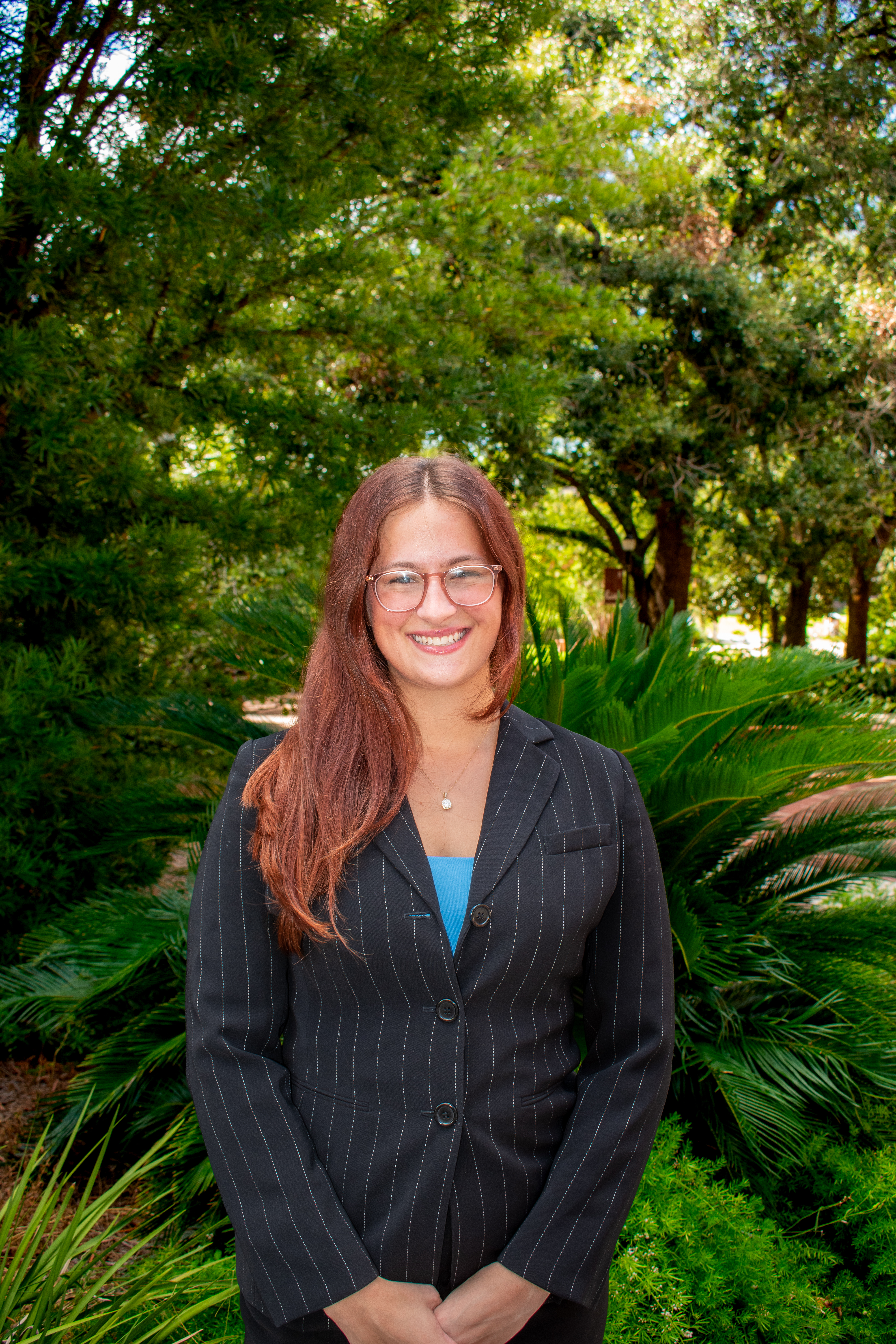
BIO
I was born and raised in Tallahassee, FL and am proud to be a First Generation student at FSU. I am currently completing an Honors Thesis in Far Right European Parties, in addition to my wonderful work with Dr. Emma Fridel on Risk Protection Orders in Florida. I am also currently working on my Research Intensive Baccalaureate Certificate, where we are working on a research project concerning affective polarization in US politics. In addition to my research commitments I am a Legislative Intern at The Florida Capitol and I intern for an immigration law firm in Tallahassee. I am looking forward to working on Capitol Hill this summer with the office of Congresswoman Frederica Wilson. Upon graduation I plan to go to law school and work to become a Civil Rights Attorney. I hope my work will also bring me on the policy side of some of the core issues that drive my career, especially in the areas of criminal justice and human rights.
A Mixed-Methods Evaluation of the Impacts and Implementation of Florida’s Risk Protection Order (RPO) Law
Authors: Francisca Puiatti, Dr. Emma FridelStudent Major: Criminology and Political Science
Mentor: Dr. Emma Fridel
Mentor's Department: Criminology and Criminal Justice Mentor's College: College of Criminology and Criminal Justice Co-Presenters: Andronika Christian, Nashley Gabriel Cardenas, Tatiana Giraldo and Olivia Jaillet
Abstract
The goal of this project is to explore the efficacy and implementation of Risk Protection Orders (RPOs) in Florida. RPOs were introduced in the Florida Legislature in 2018 and since their inception very few studies have been conducted on them. It is important that we investigate the implementation of RPOs on a larger scale to determine whether they are an efficient mechanism to reduce gun violence. The three stages to this analysis are: collecting the data from over 15,000 RPO cases from Florida to create a database, running four levels of quantitative analysis to evaluate the effect of RPOs on reducing gun violence and using mixed methods to explore the differences in RPO implementation across jurisdictions. Although the project is in its first stages, it promises to strengthen and broaden the knowledge on RPOs and their relation to gun violence exponentially. The database created will be the largest and most representative sample of RPOs and will allow for the most comprehensive evaluation of a state’s RPO laws. The findings generated by the analyses will reveal important trends of the implementation and efficiency of RPOs in preventing gun violence, an ongoing issue that has affected millions of lives. Researching the efficacy of the legislation that is created to reduce gun violence will allow future legislators to create new and better solutions.
Keywords: Gun, Firearm, Risk Protection Orders, Gun Control
25th annual Undergraduate Research Symposium, April 1, 2025
Reza Noori Poster Session 3: 1:45 pm - 2:45 pm/ Poster #134

BIO
I am a second-year Clinical Professions major pursuing a pre-med track at Florida State University. My current research explores the correlation between micronutrient intake and Vascular Dementia risk factors.
Impact of Macronutrients, Micronutrients, and Minerals in Risk Factors of Vascular Dementia
Authors: Reza Noori, Julia ShefflerStudent Major: Clinical Professions
Mentor: Julia Sheffler
Mentor's Department: Center for Translational and Behavioral Sciences Mentor's College: FSU College of Medicine Co-Presenters: Jonathan Michel, Sarvika Dasari
Abstract
Vascular dementia (VaD) is a growing global health concern, exacerbated by an aging population and its associated economic and social burdens. While there is no cure, prevention strategies targeting modifiable risk factors—particularly diet—have gained significant attention. Macronutrients, micronutrients, and minerals play crucial roles in cognitive function and vascular health, yet their specific mechanisms remain unclear. Dietary patterns such as the Mediterranean and ketogenic diets have shown the potential to reduce dementia risk by improving metabolic and cardiovascular health. This study examines the relationship between specific dietary components and VaD risk factors in high-risk older adults through a 10-week pilot clinical trial. Thirty-one participants (aged 55–85 years, MoCA ≥16) were randomized into four intervention groups: a Mediterranean diet or a Mediterranean ketogenic diet, with or without a support group. Assessments included dietary tracking (Nutritionix), blood biomarker analysis, gut microbiome composition, and cognitive testing using the NIH Toolbox Cognition Battery. Macronutrient ratios, antioxidants, omega fatty acids, and essential minerals (magnesium, potassium, calcium, selenium, zinc) were analyzed alongside vascular risks. This study aims to identify how specific dietary components are associated with change in executive functioning, blood pressure, and cholesterol across a 10-week dietary intervention. These findings will contribute to a broader understanding of dietary interventions for mitigating vascular dementia risk in aging populations.
Keywords: Vascular, Dementia, Micronutrients, Macronutrients, Minerals, Diet, Lifestyle
25th annual Undergraduate Research Symposium, April 1, 2025
Celina Pradhan Poster Session 4: 3:00 pm - 4:00 pm/ Poster #54

BIO
My name is Celina Pradhan, and I am pleased to be presenting at the 2025 Undergraduate Research Symposium. Originally from Dallas, Texas, I have found a wonderful home here at Florida State University! I am currently a sophomore pursing a degree in Psychology with the goal of attending a PhD program in clinical psychology. Ultimately, I hope to practice as a licensed clinical psychologist, specializing in mental health intervention and treatment across all ages and backgrounds in an effort to expand mental healthcare access. I have had the privilege of interning at McKinney Neuropsychology, where I was able to gain amazing experiences in clinical settings and learn directly from passionate and practiced clinicians. These professional opportunities have further solidified my passion for psychology and fueled my exploration of academic interests. I am deeply honored to not only be presenting my academic research, but to also have the opportunity to connect with fellow researchers and expand my knowledge of various research projects across diverse disciplines.
Examining The Lived Experiences and Caste-Based Occupational Health Outcomes of Manual Scavengers in India
Authors: Celina Pradhan, Choeeta ChakrabartiStudent Major: Bachelor of Science in Psychology
Mentor: Choeeta Chakrabarti
Mentor's Department: Department of Anthropology Mentor's College: Florida State University Co-Presenters:
Abstract
This study examines the lived experiences and health disparities faced by male manual scavengers residing in the slums of Dharavi, Mumbai. Manual scavengers are individuals who manually clean human excreta from dry latrines, open drains, and septic tanks—an extremely hazardous occupation that exposes them to severe health risks. This work is predominantly performed by Dalits, formerly known as ‘untouchables’— a marginalized caste group historically condemned to degrading and stigmatized labor under the caste system. Although now federally outlawed, caste-based occupational exclusion continues to persist across generations, subjecting these workers to social and health inequities. The nature of their work, combined with everyday discrimination, contributes to significant psychological distress— often leading to alcohol dependence. This study presents preliminary findings based on ethnographic interviews and psychometric assessments of alcoholism, depression, loneliness and perceived stress. By analyzing these intersecting vulnerabilities, this study aims to shed light on the structural inequalities that perpetuate health risks among this historically marginalized population.
Keywords: Manual Scavengers, Health Outcomes, Occupational Exclusion
25th annual Undergraduate Research Symposium, April 1, 2025
Sophia Norris Poster Session 2: 10:45 am - 11:45 am/ Poster #273

BIO
My name is Sophia Norris, I am a pre-dental student at Florida State University. This year, I worked with Dr. Shannon Hall-Mills in the Bridges SPEAR Lab to further explore language disorders in children. This was a qualitative study where we performed group interviews with speech language pathologists across the United States. We asked participants questions related to their experiences with language disorders in school aged children. We then analyzed our transcript of the interviews and found common themes of results throughout the study.
The Language-Literacy Bridges Project: Developmental Language Disorders in Children
Authors: Sophia Norris, Dr. Shannon Hall-MillsStudent Major: Interdisciplinary Medical Sciences Clinical Professions
Mentor: Dr. Shannon Hall-Mills
Mentor's Department: School of Communication Science and Disorders Mentor's College: Communication Science and Disorders Co-Presenters: Margaret Cavallari
Abstract
The Language-Literacy Bridges Project, conducted in the School-based Practices, Effectiveness, and Research (SPEAR) Lab at Florida State University’s School of Communication Science and Disorders, investigates language learning in children through group studies with speech-language pathologists (SLPs). This research study aims to enhance understanding language development challenges, particularly in children with Developmental Language Disorders (DLD). Given the prevalence of DLD, with an estimated 7.58% of children affected, it is one of the most common neurodevelopmental disorders (McGregor, 2020). To help enhance educational results we are researching how SLP practices influence language intervention in reading outcomes within school-age children across the United States.
Through focus group interviews, this research seeks to identify key themes among SLPs related to their professional perspectives and use of evidence-based practices (EBP), including discussion of perceived facilitators and barriers to support reading comprehension. Acknowledging the persistent challenges in reading comprehension and treatment effectiveness, this study seeks to refine intervention strategies and bridge literacy gaps in child education. The findings will contribute to advancing language-learning support and improving educational outcomes for children with DLD.
Keywords: Reading, Comprehension, Speech
25th annual Undergraduate Research Symposium, April 1, 2025
Brianne Wefel Poster Session 3: 1:45 pm - 2:45 pm/ Poster #48
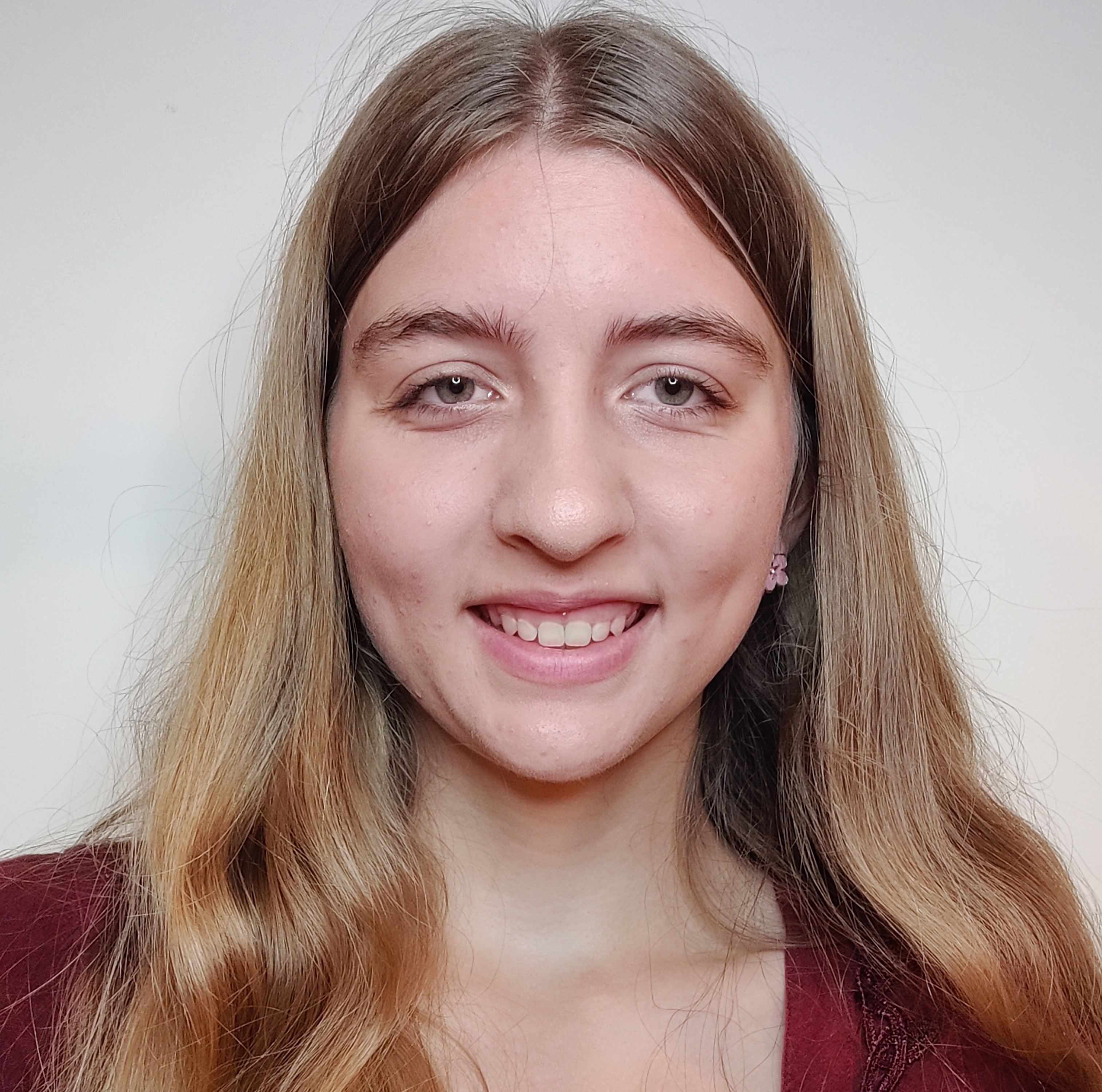
BIO
Brianne is a first year undergraduate student currently on the Physics major track. Originally from Illinois, she is enjoying her first year and the nice warm weather. She appreciates this opportunity to be a part of UROP, as it let her dip her toes into the world of research.
Microscopes and Bioart: Using Microscopy to Create Art
Authors: Brianne Wefel, Jamel AliStudent Major: Physics
Mentor: Jamel Ali
Mentor's Department: Chemistry and Biochemistry Mentor's College: College of Engineering Co-Presenters:
Abstract
Bioart is a subfield of art focused on living systems. This field is often aided by the use of microscopes to form aesthetically interesting images. In this UROP project, we learned and used various types of bright field microscopy in order to create Bioart pieces. Through the use of upright and inverted light microscopes, we applied wide-field, reflected, polarized light, phase contrast, and differential interference contrast imaging modes for creating aesthetically striking images. My personal focus of this project is the local Spanish moss, Tillandsia usneoides, and an interesting strain of slime mold, Physarum polycephalum. The moss was chosen for its local significance and the slime mold for personal interest. The end goal of this work is to eventually create a piece to be submitted to the annual Nikon Small World Competition for microscopy. The purpose of this work was to train in microscopy and to create a piece of art in a scientific setting, as scientific partnerships with art can create better understanding of scientific concepts and bring science and art closer together.
Keywords: Bioart, Microscopy
25th annual Undergraduate Research Symposium, April 1, 2025
Chable Graddy Poster Session 3: 1:45 pm - 2:45 pm/ Poster #167
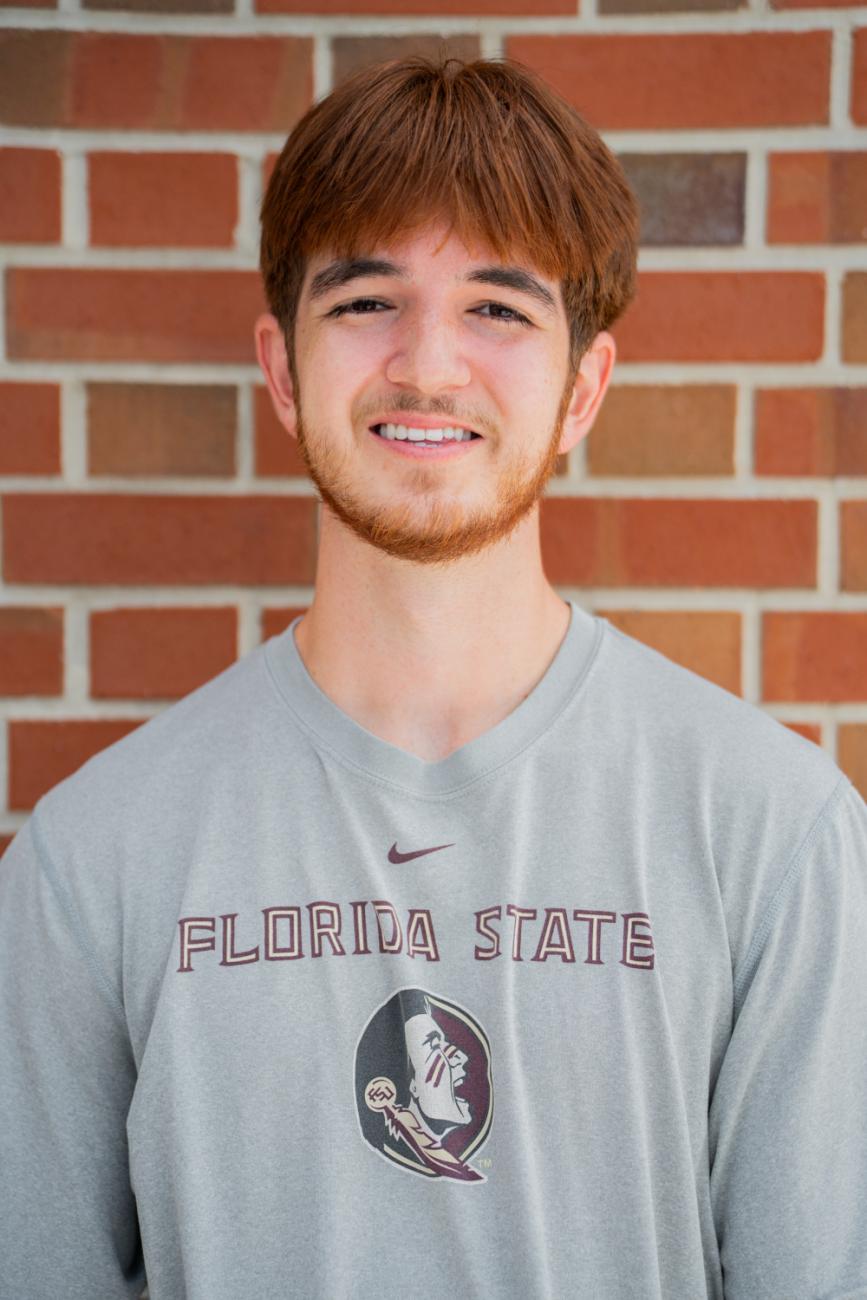
BIO
I am a freshman Finance major from Windermere FL. My involvements on campus are UROP, Honors, Presidential Scholars, and Club Pickleball.
Disability Homicide Database
Authors: Chable Graddy, Brendan LantzStudent Major: Finance
Mentor: Brendan Lantz
Mentor's Department: College of Criminology & Criminal Justice Mentor's College: Penn State University Co-Presenters: Kenneth Bevan III, Malia Crew, Harper Kaplan, Julia Lobodzinski, Kennedy Murphy
Abstract
Violence against individuals with disabilities is a significant social issue, with fatal incidents—specifically those committed by family members or caretakers—being of particular concern. Addressing this violence requires a comprehensive understanding of these incidents; however, detailed data on such cases is currently lacking. This research project aims to fill this gap by developing a database of known homicides of disabled individuals in the United States over several decades. Researchers compiled data using open source data collection techniques, including collecting data from media reports, police records, social media, and obituaries, coding cases based on variables such as age, location, race, gender, type of violence, criminal history, and warning signs. The goal was to reach data saturation, ensuring the most complete picture of each case. This dataset enables pattern analysis through data analytics and research reports, providing patterns that can inform strategies to protect individuals with disabilities. Key indicators, such as prior criminal history or past child protective services involvement, can help law enforcement identify and intervene in high-risk situations before violence occurs. In the next phase, this project will continue gathering data and refining its approach seeking out common themes to better understand and prevent violence against individuals with disabilities. Collaboration with policymakers and law enforcement will play a crucial role in strengthening protective measures and addressing systemic gaps. Through ongoing analysis and public awareness efforts, this research aims to drive meaningful change and build a safer, more just society for individuals with disabilities.
Keywords: Crime, Murder, Database, Homicide
25th annual Undergraduate Research Symposium, April 1, 2025
Collin Nester Poster Session 3: 1:45 pm - 2:45 pm/ Poster #258
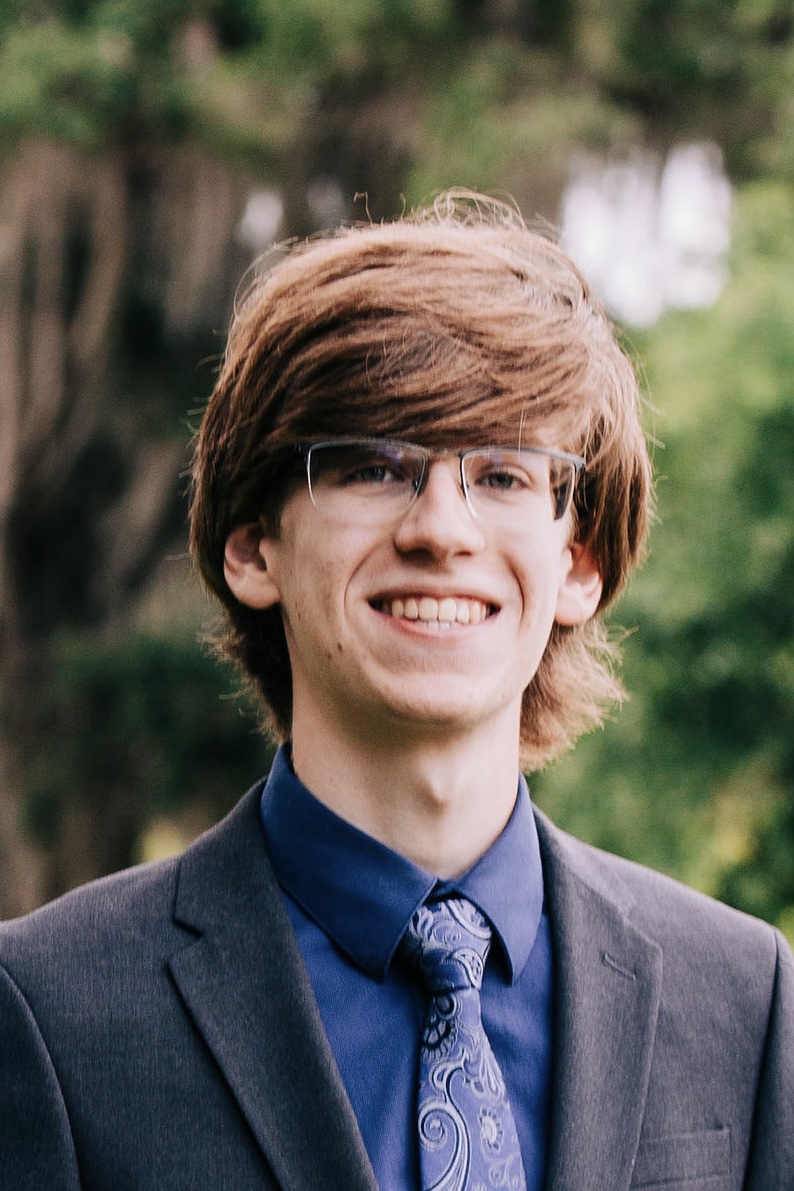
BIO
A Tallahassee native, Collin is a science-loving student at the FAMU-FSU College of Engineering. He is excited to be doing research at the collegiate level and appreciates the opportunity provided by his research mentor and the tribology lab.
Tribology of PTFE Filled Composites against DLC Countersamples
Authors: Collin Nester, Catherine FiddStudent Major: Mechanical Engineering
Mentor: Catherine Fidd
Mentor's Department: Materials Science and Engineering Mentor's College: FAMU-FSU College of Engineering Co-Presenters:
Abstract
Polytetrafluoroethelyne (PTFE) is a low friction polymer with a high wear rate. Thus, it is commonly filled with other polymers/metal powders to add structure and reduce the wear rate. Diamond-like carbon (DLC) coatings have high hardness and low friction, but filled PTFE has yet to be tested on a DLC countersurface to determine its frictional and wear properties. In this experiment, samples of PTFE+Al2O3 and PTFE+PEEK were tested under load on a DLC countersurface in a reciprocating tribometer. The wear rate and frictional coefficient for the Alumina-containing samples were significantly reduced as compared to stainless steel (SS), with moderate improvements for the PEEK samples as well. Fourier Transform Infrared (FTIR) spectroscopy revealed differences in tribochemical formation on the DLC countersurface compared with the SS countersurface
Keywords: tribology, PTFE, DLC
25th annual Undergraduate Research Symposium, April 1, 2025
Brooke Taylor Poster Session 1: 9:30 am - 10:30 am / Poster #274
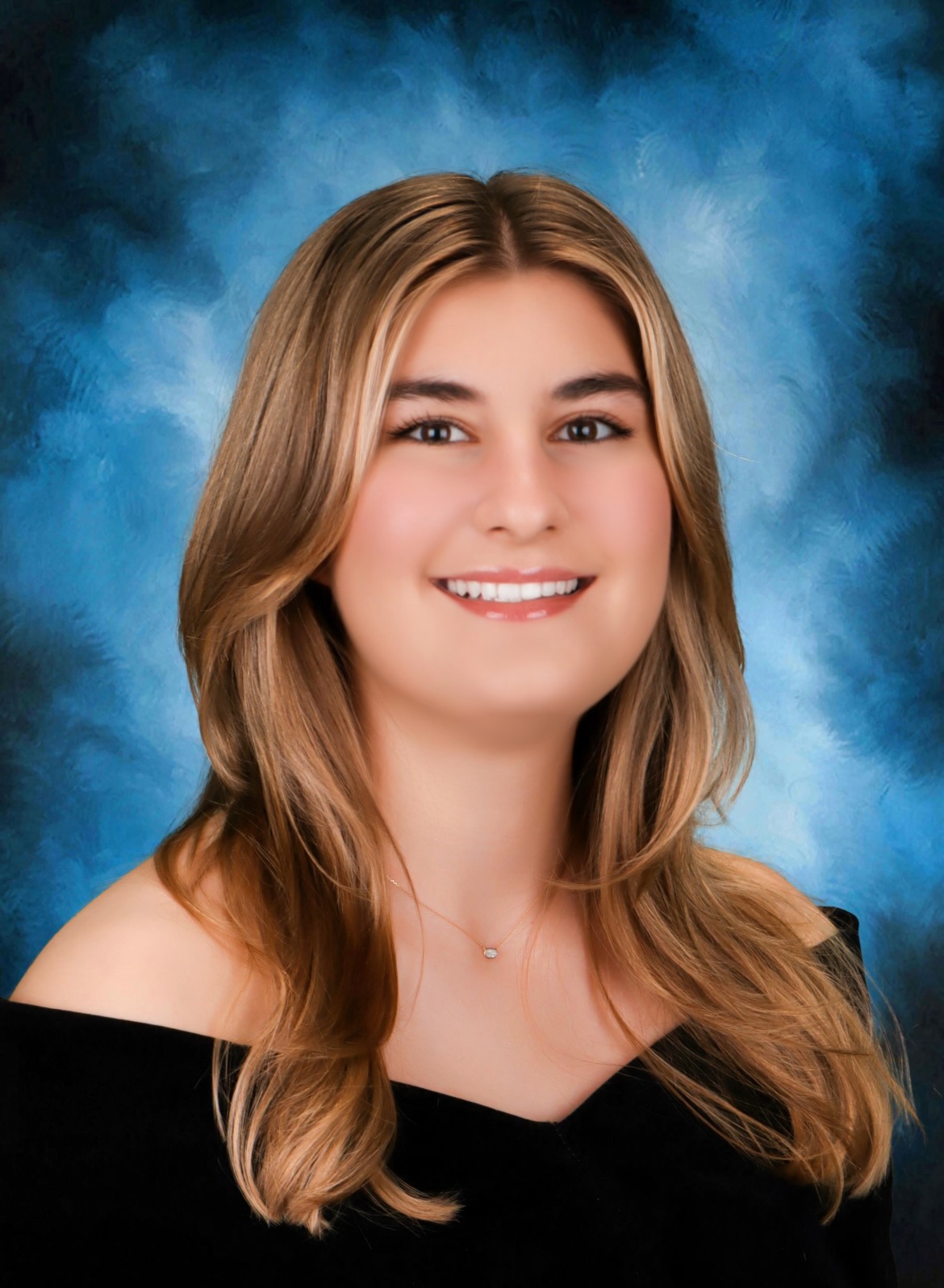
BIO
I am interested in learning more about how our government works and interacts with one another and with the people. I have been in the field of politics since the age of 15, which is why I am so passionate about furthering my education, as well as others, on this important topic that affects everyone in the United States.
Minority Party Power Capacity in Congress
Authors: Brooke Taylor, Andrew BallardStudent Major: Political Science
Mentor: Andrew Ballard
Mentor's Department: Political Science Mentor's College: Social Sciences and Public Policy Co-Presenters:
Abstract
The growing polarization of political ideology and perception of compromise within the United States Congress has impacted the minority party’s significance in conducting legislation. We argue that the capacity of the minority party to exert legislative influence is a function of three factors:
1) Constraints on the majority party, which create opportunities for the minority party
2) Minority party cohesion on the issue at hand
3) Sufficient motivation for the minority to engage in legislating rather than electioneering Building on previous research conducted by FSU Political Science Professor Andy Ballard, who analyzed the 99th through 109th Congressional sessions, this examination fills in the gaps, compiling data from bills proposed during the 116th Congress. Utilizing an Excel spreadsheet to assess these legislative proposals and their language retrieved from the Library of Congress, we coded each by two criteria:
1) Major topic of the bill
2) Minor topic of the bill—derived from the Topics Codebook of the U.S. Policy Agendas Project Updated Spring 2019 edition
Ultimately, bills were more likely to reach the floor and become law when majority constraint was high and minority cohesiveness was high, underscoring the importance of the minority party’s influence in the legislative agenda and lawmaking. Our updated assessment has important implications for theories of congressional party power and our understanding of minority party influence on Capitol Hill.
Keywords: Political Science, Minority Party, Congress
25th annual Undergraduate Research Symposium, April 1, 2025
Brianna Burchell Poster Session 1: 9:30 am - 10:30 am/ Poster #49
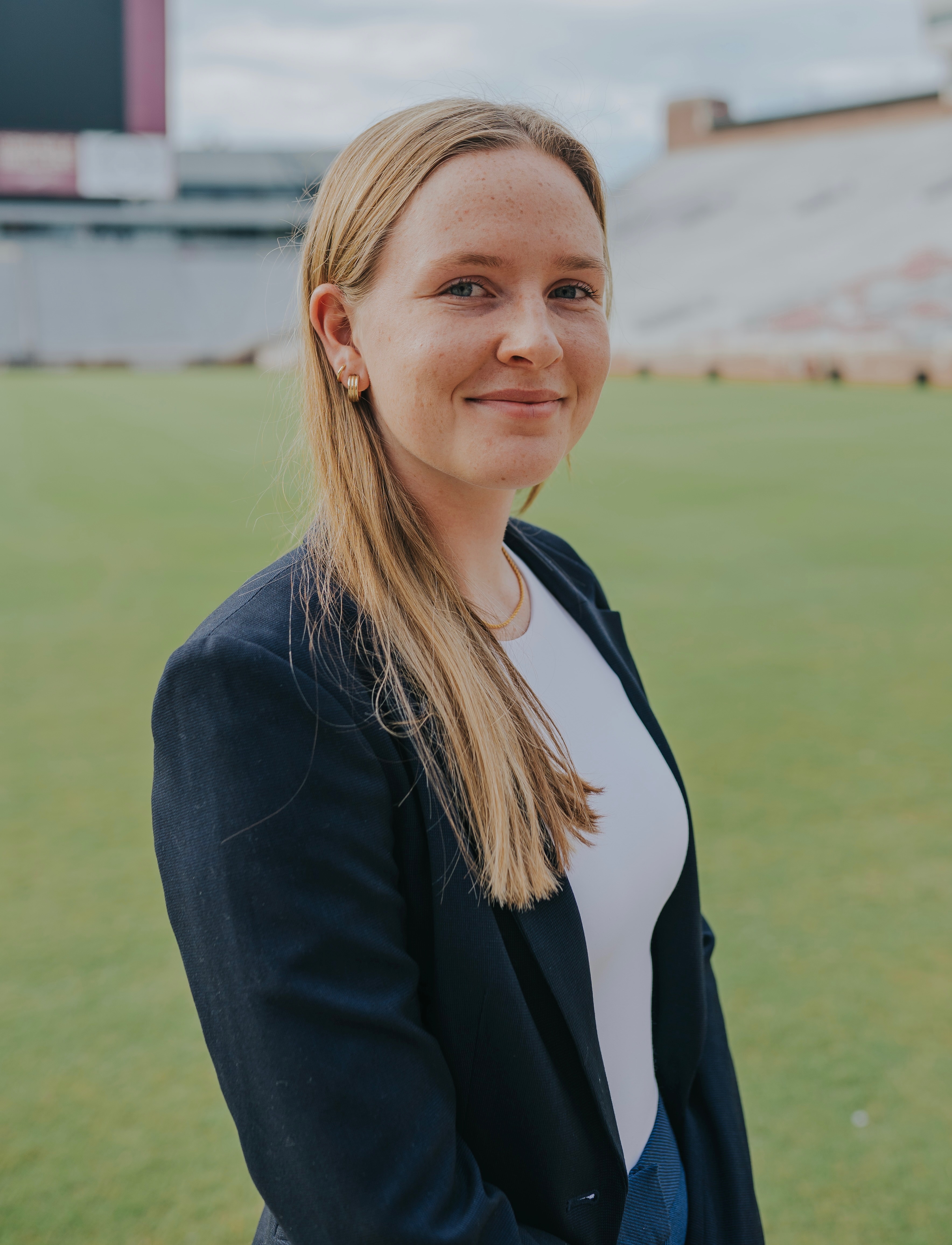
BIO
I am currently studying International Affairs with a minor in English Literature, Media, and Culture. Through serving refugees in the Tallahassee area, I have developed a passion for understanding marginalized communities. This research project developed my curiosity about literature's role in providing clarity to the injustices marginalized populations face. In the future, I plan to pursue law school in the hope of being a voice for the voiceless.
Literature and the Social Sciences
Authors: Brianna Burchell, Rebecca McWilliams Ojala BallardStudent Major: International Affairs
Mentor: Rebecca McWilliams Ojala Ballard
Mentor's Department: Department of English Mentor's College: College of Arts and Sciences Co-Presenters:
Abstract
Interdisciplinarity can be found between Literature and the Social Sciences. Rebecca Ballard proposes that storytelling can provide insight into the intricacies of structural violence as an example of this interdisciplinary relationship. From doing citational editing on her book, I developed a curiosity to understand how literature can be a method for informing solutions to injustice. This led me to my research question: How do scholars make claims about literature’s role in addressing social issues? To answer this research question, I focused on a work of environmental justice ecocriticism, a field that discusses how literature can address the environmental inequality people face. I looked at Rob Nixon's “Slow Violence and the Environmentalism of the Poor”, where he discusses Arundhati Roy’s critique of the Sardar Sarovar Dam on India’s Narmada River. This research could further understanding of literature's role within the social sciences, specifically providing insight into how literary works cultivate an understanding of societal issues in the reader.
Keywords: literature, social science, structural violence
25th annual Undergraduate Research Symposium, April 1, 2025
Liberty West Poster Session 3: 1:45 pm - 2:45 pm/ Poster #168

BIO
Liberty is an undergraduate student at Florida State University pursuing a dual degree in anthropology and art history with minors in chemistry, museum studies, and Italian. Her research interests include fashion history, art and artifact conservation, medieval manuscripts, archives, collections management, archaeology, and chemistry. Liberty will continue her exploration of archaeology, curation, and artifact handling as a Bucher-Loewenstein Museum Studies intern in Italy, as well as through her Honors in the Major Project focusing on the comparative spectroscopic analysis of Mississippian pottery. After graduation, Liberty plans to attend a graduate program in artifact conservation and specialize in paper conservation.
The Morning Dress: A Study of Status, Function, and Dress Reform in 19th Century Fashion
Authors: Liberty West, Mrs. Tara HackettStudent Major: Anthropology, Art History
Mentor: Mrs. Tara Hackett
Mentor's Department: Retail Entrepreneurship Mentor's College: Jim Moran College of Entrepreneurship Co-Presenters:
Abstract
The purpose of this research is to accession objects within the Jim Moran College Historic Costume and Textiles Collection and to update the database with garment descriptions and photographs. This research aims to examine morning dresses in the Costume Collection and explore their social and fashion significance in the 19th century. Methods include accessioning textile objects, denoting descriptions of fabrics, weaves, construction, and stylistic elements of garment, digitizing and photographing of textile objects. Literature review of morning dresses has consisted of primary sources such as: fashion plates, advice columns, and women’s magazines; museum collections; and recent publications on dress reform and social practices in the late 19th and early 20th centuries. To date, five morning gowns have been identified within the Costume Collection, with three selected for in-depth analysis in this research. Morning dresses were commonly worn by women during the Victorian and Edwardian eras, serving both as informal attire for the morning and as appropriate dress for receiving guests at afternoon tea. The construction of morning gowns reflects more progressive societal values, historicism in fashion, classism, and the dress reform movement. The morning gown became more elaborate as time passed and evolved into the tea gown. This research will help identify other morning dresses within the Historic Costume Collection, as well as their uses and historical context. The identification of morning dresses will aid future exhibitions, garment care practices, and the analysis of the evolution of the tea gown.
Keywords: Fashion, Historic Dress, Textile Conservation
25th annual Undergraduate Research Symposium, April 1, 2025
Shiv Patel Poster Session 4: 3:00 pm - 4:00 pm/ Poster #273
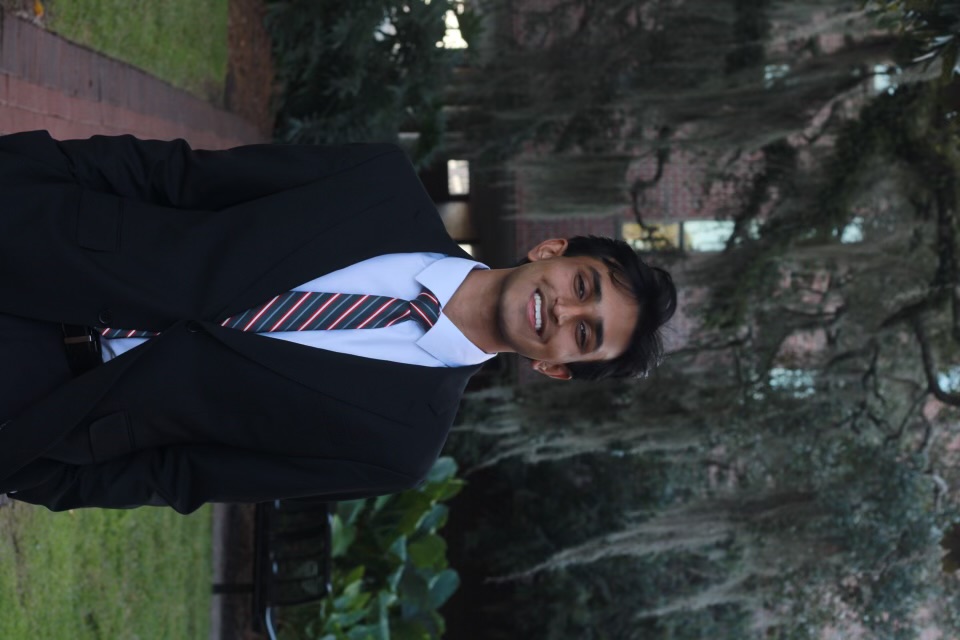
BIO
I'm Shiv, a 1st year Exercise Physiology major. I'm from Tallahassee and my research interests include AI in healthcare, cancer genomics, and clinical analytics.
Developing a Trustworthy AI Chatbot for Personalized HIV Care
Authors: Shiv Patel, Ruosi ShaoStudent Major: Exercise Physiology
Mentor: Ruosi Shao
Mentor's Department: Communication & Information Mentor's College: College of Communication & Information Co-Presenters: Sreeja Patnala
Abstract
People with HIV (PWH) face persistent barriers to optimal care, including challenges with antiretroviral therapy (ART) adherence, retention in care, and engagement with preventive health services. These barriers disproportionately affect minoritized populations and contribute to disparities in viral suppression and overall health outcomes. Digital health interventions, such as conversational agents (CAs) or chatbots, offer a scalable and accessible means to support PWH across the HIV care continuum by providing personalized, real-time health guidance
To address these challenges, we developed a personalized, AI-powered chatbot—Aipaca—designed to deliver real-time, evidence-based HIV care guidance. Leveraging Large Language Models (LLMs), our chatbot integrates clinically validated recommendations to enhance the accessibility, accuracy, and inclusivity of HIV support.
To fine-tune the AI, we curated a comprehensive HIV Knowledge Bank covering the full continuum of HIV care. This included over 1,080 pages of peer-reviewed material, 450 quiz questions, and 1.2 million tokens of synthesized content. We benchmarked both open-source (Llama, Mistral) and closed-source (GPT-4, Gemini) LLMs on clinical accuracy, reasoning, and patient-centered communication. Preliminary results demonstrate the feasibility of using AI chatbots to provide personalized care, including support for mental health, medication safety, and HIV prevention strategies such as PrEP.
Ongoing efforts include expert interviews to refine clinical applicability, pilot testing with PWH, and performance validation to ensure the chatbot’s safety, accuracy, and scalability in real-world healthcare settings. Our findings highlight the potential of AI chatbots to transform HIV care by offering personalized, accessible, and trustworthy support for PWH.
Keywords: Artificial Intelligence, HIV, Chatbot

